#where he was immediately decried as an animal
Explore tagged Tumblr posts
Text




Marvel Comics Presents (1988) #75
#of course this makes me think of the response to Logan’s original mutation in Wolverine: The Origin (2001)#where he was immediately decried as an animal#but also how he developed amnesia there#as his brain’s way of protecting him from the traumatic event which caused the physical transformation#but was so extreme that he would have been doomed if he didn’t have Rose to take care of him#because he was confused and didn’t know anything#he became disabled to the point of needing a high level of care/direction for a time#it feels cyclical to have these elements again at Logan’s second transformation#but now this has been done to him on purpose#and he will be manipulated in his vulnerable state#‘his subconscious stripped bare… cut from his very soul… and scored to the bone’#marvel#logan howlett#my posts#comic panels
7 notes
·
View notes
Text
Detour (MDNSY Oneshot)
For an ask about the reactions of the JJK cast on MDNSY Gojo's... everything 😂
Scrubstan22 finds himself in the (un)enviable position of explaining Ru-kun to the JJK cast
(Link here: or read below)
Nanabi Shun, better known by his online handle ‘Scrubstan22’ is having his most surreal day yet. An unhinged mad scientist turned villain with a space-time quirk and an obsession with Ru-kun that borders on the same level as even the most delusional of Scrubs, has accidentally flung him, an innocent bystander, into an alternate dimension.
This would be terrifying, if it wasn’t apparently some kind of alternate dimension where Ru-kun’s anime is real.
And not only is it real… it’s apparently Ru-kun’s true origin story??
To be fair, it’s still terrifying, but Scrubstan22 has more pressing matters to focus on than his own mortality and possible impending doom.
Gojo Satoru apparently exists in this world— but Ru-kun does not.
It’s utterly absurd! It’s unreasonable and unfair! Maybe those songs really do already exist in this world— as the very unamused talking Panda keeps trying to tell him— but if No Scrubs and Ru-kun aren’t performing it, then they don’t actually exist at all! Nanabi couldn’t possibly put into words how life-changing it was to see Ru-kun perform in person. The fact that he doesn’t exist in this world— or at least not as the shit-posting global celebrity rockstar that Nanabi knows him as— is really quite sad. These poor kids don’t know what they’re missing out on. As a major Scrub and Ru-kun simp, Nanabi just can’t let this slide. He has to rectify it immediately.
Luckily he has a perfect solution.
His entire downloaded archive of all things No Scrubs and Ru-kun.
Some of Gojo Satoru’s students are more impressed than others.
“I hate that he looks so good in that skirt,” comes from the glasses-wearing girl. Maki, he thinks is her name. He only watched through the anime once so he’s pretty bad with the names of all the side characters.
“I should have known he’d make an excellent Sailor Moon after he stole my uniform.” Kugisaki Nobara complains, looking exactly as her character does in the anime.
Neither of them are enthused to see Ru-kun in his crossdressing glory, but Nanabi notices they’re unwillingly enthralled nonetheless.
Itadori Yuuji himself— the main character of Cursed Fight Season One— is unsurprisingly the most enthusiastic about it all. He nearly climbs over Nanabi for a better look at the recording on his phone, eyes alight.
“Sensei is so cool as a rockstar! It really suits him well!” Itadori exclaims, delighted. “And he’s singing ‘My Chemical Romance’? Sensei has such good taste!”
“He’s just an emo-punk loser who clearly had way too much time on his hands,” Fushiguro Megumi protests, although despite his inflammatory remarks he too doesn’t look away from the screen.
Apparently quite a few No Scrubs’ songs are from this band ‘My Chemical Romance’. Yuuji even shows him the music video of the same song from the actual band just to prove it, although that was wholly unnecessary. Nanabi believes him when he says all these songs already exist in this world and belong to other bands— he just doesn’t care. If anything, seeing the other bands perform it just confirms what he already believed; Ru-kun does it better.
Nanabi is happy to show them all the fan recordings he has of No Scrubs, gushing over the various outfit choices and the songs themselves. It’s actually kind of nice that these songs exist already, because that means these kids already know them and he can argue about which are superior without having to explain. Itadori’s favorite is ‘A Loaded God Complex’, called ‘Sugar We’re Goin’ Down’ in this world (although Itadori admits the changed title suits Ru-kun far more), Fushiguro’s is ‘Island in the Sun’, and Panda translates that Inumaki’s is ‘Thanks for the Memories’, but Panda himself confesses he’s unfamiliar with this genre of music. The two girls decry all their picks as boring, and don’t seem particularly impressed by any of Ru-kun’s songs until—
“Paramore!!” The two girls screech in unison, suddenly looking a lot more invested than they had earlier.
Nanabi has up a recording from the Scrubs Unite tour, which Ru-kun had done entirely in drag. They’d finally gotten to the encore, where Ru-kun had tried to weasel his female bandmates into singing the encore song, insisting it was made for a female vocalist. They summarily denied him, so he ended up singing the song himself, called Misery Business. It’s one of Nanbi’s favorite performances, and one Ru-kun hasn’t done since.
Even Maki and Kugisaki are begrudgingly impressed.
“He sounds like a male Hayley Williams— that’s so fucking unfair,” Kugisaki denounces, despairing. “Why does that bastard have to be good at everything, seriously.”
“The outfit is pretty spot on too, if he just dyed his hair, it’d be a great cosplay.” Maki agrees, sourly.
“Does he play anything else from Riot?” Kugsaki rounds on him. “What about That’s What You Get?”
Nanabi looks up at her helplessly. “Sorry, I don’t think so. But they apparently have a ton of unreleased stuff though, so maybe I just haven’t heard it.”
Apparently back when No Scrubs was truly an underground band playing random shows at dive bars, they had an insanely large setlist. Most of those songs never made it onto any of the official recordings. He’s heard rumors online that there’s a vinyl floating around, but aside from a single interview with All Might, has no real confirmation of its existence.
“I think it’s awesome that Sensei has an alternate personality as a rockstar,” Yuuji enthuses, looking rather fond and indulgent as he stares down at Ru-kun strutting across a stage. “I hope it’s more relaxing than being The Strongest all the time.”
Nanabi blinks at him. “Oh. He’s that too.”
The Jujutsu Tech students stare at him blankly. “... What?”
//
As it turns out, they’re all collectively more confused and bewildered by the whole Sixwings thing than they are the ‘world’s strongest’ thing. In this world, since the moment of his birth Gojo Satoru was always meant to be the strongest. That he can destroy armies in the blink of an eye and pull out purple-laser-death-beams-of-doom (apparently a technique called Hollow Purple in this world) and walk through explosions unscathed is just common knowledge among the Jujutsu World.
So all of his footage of Dabi’s many international exploits was met with a genial disinterest.
His media folder of Sixwings, however…
“He’s… really in a relationship?” Kugisaki looks utterly confounded. “A normal, healthy, longterm relationship?”
“He’s getting married?” Maki sounds bewildered.
“He has a kid?” Fushiguro sounds unimpressed.
Panda scratches his chin. “Huh. Hey, that’s good for him! He sounds like he’s actually a well-adjusted and normal guy.”
“Is his boyfriend a psychopath?” Kugisaki asks, urgently. “I really can’t see how else this would work out.”
“Not at all! Hawks is well-known as a very charming and friendly hero. He’s actually a really good guy.” Nanabi protests.
Kugisaki squints at him. “How the hell does he put up with him then?”
Nanabi smiles sheepishly. “Uh… he’s pretty easygoing I guess?”
Maki is leaning over him for a better look at his phone, using her fingers to zoom in on the photo he has up of Hawks and Ru-kun at the U.A. School Festival. He doesn’t swing that way, but even he has to admit they looked really good that day. And with Eri thrown in on top of it? It’s no wonder they’re regularly voted as the cutest couple in Japan.
“Damn. They actually look really good together.” Maki says, begrudging.
“Tuna, tuna.” Inumaki pokes Panda in the side.
Panda gives a solemn nod. “Inumaki-kun has a good point. What’s all this gossip about a Sixwings baby?”
“Oh, that’s Eri-chan.” Nanabi scrolls down to a better photo of her. There’s one from the Ru-kun signing event at Tower Records, where a sinfully good-looking Ru-kun is holding her on his hip and waving out to the crowds. “She’s the child he birthed from his own body.”
Fushiguro blinks rapidly. “He what now?”
“He’s fucking with you.” Kugisaki denies immediately.
Nanabi shrugs. “Maybe— but no one knows for sure! To be honest, none of his powers make much sense to us, so some people believe it and others don’t.”
Maki’s expression turns worried. “Well, they’re not all that clear to us either… I mean, there’s a lot you can do with cursed energy…”
She glances up at Panda. Panda just gives her a thumbs up. “That’s right! I mean, I exist, so who knows!”
“There’s a couple different rumors about it, but none are confirmed.” Nanabi fills them in with a gleeful expression. “The main one is that she really is the Sixwings baby, and they had her when they were teenagers and kept it a secret. There’s also a couple variations where Eri is his child, but the regular way, but he’s slept with a lot of people and none of them were women so people are pretty skeptical about it. Then there’s also the theory that he did birth her from his own body, but not with Hawks. There’s no real guesses on who her father is for that one.”
His companions look at him with varying degrees of incredulity. Nanabi spreads his hands. “The likely answer is he’s just messing with everyone and she’s adopted, but like I said, we really don’t know!”
Itadori doesn’t really seem to care about the truth either way, grabbing at his phone to scroll through the photos. “They’re so cute together! Haha, she really kind of even does look like sensei a little bit! She’s definitely just as stylish as he is!”
Itadori keeps scrolling until he gets to the infamous Swing incident, saved in all its glory in an endless gif format.
They all stare in silence as, on screen, Gojo Satoru gets KO’d by his kid on a swing set over and over again.
“Send me that.” Kugisaki demands.
//
Scrubstan22 gets rescued eventually. It’s a pretty boring affair, truth be told. He didn’t see any real curses, or any kind of fighting.
Gojo doesn’t return to campus until long after the sun has set, to the bizarre scene of all his students shoving their phones at poor Nanami, who looks as if he regretted ever coming in person to turn in his paperwork. They’re apparently trying to show Nanami photos of Gojo in drag, despite his vocal protests. The moment they lay eyes on him they pounce on him instead. None of their explanations make any sense. There’s something about him being a rockstar, and also married, and apparently a mother, and they have plenty of blurry photo evidence they try to shove at him. It looks like they all took photos of someone else’s screenshots, so the quality leaves much to be desired. Maybe if he squints really hard, that does kind of look like him in a mini skirt, but who’s to say really?
Unfortunately for the students, the space-time continuum rights itself overnight and they all lose their collective memory of Scrubstan22 and his alternate-universe. But the digital evidence remains, and occasionally Kugisaki will pull out her phone and watch a very random gif of Gojo-sensei getting smacked to the ground by a kid on a swing, and while she has no idea where it came from, she draws immense satisfaction from it anyway.
237 notes
·
View notes
Note
The wildest thing about the whole Moo Deng situation to me is (and of course I make this about cetaceans) the insistence that everything here is fine, there’s no mishandling, Moo Deng is a spoiled princess, how dare you accuse her knowledgeable zookeepers of being anything less than perfect… by the same people who decry any and all cetacean captivity as horrific abuse.
Moo Deng getting her bum smacked is cute but an actually cute video of a dolphin playing in an aquarium is abusive. A random zoo guest is to be trusted when they say Moo Deng’s zoo is great (and to be clear I don’t know enough about this zoo to make a judgement call, all zoos have issues), but someone who’s actually worked at SeaWorld is either a liar or delusional (actual comment I received) when they say that no actually, their animals are not abused.
Yep all of this!
Honestly there seems to be a whole range of people on the defensive- from people who just like the zoo to people who made Moo Deng meme their whole personality.
I have to say it’s been really really weird actively criticising a zoo when I’m usually defending them.
But at this point my thesis of the original post is on full display. That groupthink plays a role in perception of animal welfare and people will pick the side that makes them feel the most comfortable.
For whatever reason people want to believe that a baby Pygmy hippo needs to get regularly grabbed, poked, chased and harassed because that’s what this one guy does and he has experience doing it so it’s fine?
But some of those same people saw a documentary once and decided that they know more than people with hundreds of years of combined experience with orca husbandry and care.
The people that are accepting of a challenge to that perception are willing to accept some discomfort because they’re more concerned about welfare.
When that reddit post came out (with experience including: goes to the zoo, maybe knows some history of the keeper?) it was immediately snatched up and ran with.
Since then I’ve seen the same comment of “net zero information” multiple times, the same accusations of racism and the same lines of “he’s so experienced he knows what he’s doing”, “the mum’s fine with it” and “it’s desensitisation” (that one hurts to read every time ngl
It’s like they just are copy and pasting someone else’s thoughts. Just parroting it verbatim without any sort of thought.
Not a single question asked about how this person knows this information, no demanding of qualifications or where they work… just happy acceptance of information that allows them to continue to enjoy their meme.
it’s wild to see the notes popping up in my notifications of “but he’s so experienced! He has so much training!” About this one zoo keeper that has multiple videos of him deliberately sneaking up on his animals, hitting them and blasting them with a hose.
Like damn I wish people would go to bat so hard for zookeepers all the time. Except maybe the ones that don’t harass their animals for clout?
Of course it’s kind of hilarious watching this unfold as a former dolphin trainer that regularly was called an abuser for… let’s see… training dolphins with positive reinforcement in the ocean.
Is it the intelligence thing? Do people think Pygmy hippos are too dumb to need enrichment and decent habitats? Or that because this guy raised hippos before he is completely incapable of making a mistake or using outdated practises?
I had someone genuinely saying that Pygmy hippos “just behave differently” to other animals. As if a fight or flight response behaviour looks totally different in this specific species of animal.
As if they are not ungulates who are herbivores and do absolutely get predated upon and are not immune to the stress response or somehow is incapable of feeling a smack that they very clearly startle from.
Idk the mental gymnastics people are doing to justify shitty animal husbandry must be exhausting.
62 notes
·
View notes
Text
[ID: several excerpts from the linked article
1) "In 2022, Russia attacked a children’s hospital and maternity ward in Mariupol, Ukraine, killing three people. The bombing made news headlines for days. Journalists flatly accepted the idea that the strike was deliberate in advance of any independent investigation, because, frankly, why else would you bomb a hospital? NPR, for instance, reported that “the World Health Organization (WHO) decried the Russian airstrike that devastated [the medical complex].” Verbs like “decry” and “devastate” capture the appropriate reflexive response to assaults on healthcare.
Yet for the past four months in Gaza we have witnessed an attempt to dull this response. Israel’s assault on medical infrastructure amounts to one of the few discernible military objectives of this war. This makes sense, as medicine’s commitment to life compromises the effective implementation of genocidal intent."
2) "Six hundred and twenty-seven healthcare workers have been killed by Israeli forces so far, according to the WHO. Forty-seven ambulances have been damaged or destroyed through direct targeting, often while bringing victims of the most recent Israeli air strike to the hospital. Women in active labor sometimes rely on donkeys for transport to medical facilities, although even these animals are not safe from targeting."
3) "In late December, the WHO reported that there was one toilet for every 480 persons in Gaza. Eight thousand new cases of hepatitis A and almost 45,000 new skin rashes have been reported, along with tens of thousands of new respiratory infections and 165,000 new cases of diarrheal infections, including more than 85,000 cases in children less than 5 years old.
Today, because of the Israeli prohibition on diagnostic tools and, more importantly, the prevention of safe access to hospitals, many infectious diseases can’t be formally diagnosed. If people can reach a healthcare facility at all, there is often no available treatment, even for things like cholera (which causes profuse watery diarrhea) whose treatment is fairly simple: rehydration."
4) "In a video from early February, Dr. Said Ma’arouf, a pediatrician who was taken hostage while working at Al-Ahli Hospital, testified to various modes of torture, his tired face suggesting there were certain indignities he wouldn’t disclose. He said he was blindfolded with his legs tied up for 45 days. He now suffered from paresthesias in his hands and had trouble standing. He had lost more than 50 pounds. Still, immediately upon his release, he returned to the hospital to care for his patients, despite the risks he knew all too well. In the video, Ma’arouf’s eyes welled as he shared that he didn’t know where his wife and five children are."
End ID]




#palestine#my descriptions#there is no way to read this article and not wish death upon every political leader and mainstream outlet that's supporting shitrael
1K notes
·
View notes
Text
533
Library of Circlaria
Remikra Timeline

Moorland: 500-510
In December 499, Fotoram, King of Moorland since 478, signed a treaty with Martenian Emperor Petrician, establishing peace between the two countries. To reinforce the terms of such, King Fotoram established New Cotts, a fortress-city in the West, to counter enemy attacks, as well as an unnamed frontier settlement on the West Coast for agents spying on Marten. It was during the first decade of the sixth century that Moorland became more of a firmly established civilization, as Cotts and New Cotts became centers of trade. To the latter came the Khaps, who brought whale blubber, animal furs, and the commodities made from silver pines. In exchange, the Moorlanders traded spellfire artifacts, buffalo furs, and grains. As a result, trade guilds began to expand, as more members joined them. Guild posts emerged throughout Cotts into surrounding villages, and then along the newly established trade route to New Cotts.
However, problems began to arise, as guild owners acquired more wealth and wanted to expand. They had a desire for more property in the city blocks of Cotts, so that they could have more of their members in closer proximity for tighter control of their wealth. They petitioned to King Fotoram, who obliged by granting them city blocks inhabited at the time by members of the working class. Such residents were forced out of their dwellings, as spellcrafters hired by the guild owners demolished the dwellings and built guild "palaces," in which the guild owners moved. Initially, they had promised to share these places with their members, harnessing cooperation; but once the buildings were complete, they were reserved only for the owners and their families. To pay for such expenses, they dramatically raised crafting fees from their members. Angered by this, members left the guilds and began practicing their crafts illegally. When informed of this, King Fotoram issued an order where villages, homes, and city blocks were raided, and mass numbers of illegal former-members arrested and imprisoned. Some of the ringleaders were even executed.
Some outlaws, though, escaped the raids and arrests, and traveled to the frontier settlement on the Coast. Here, such a place was mostly underground, embedded into a mountain. Most of the people of duty were spellcrafters, assigned by the King, who considered them outcasts. As a result, these people begrudged the King and secretly traded with the Martenians. They helped to conceal the influx of outlaws and established large underground trade posts.
Among the influx was a man named Kitor, who was a spy for the King. Upon discovery of the underground guilds, he immediately relayed information of such to the King, who sent an army to attack the settlement and slaughter most of its inhabitants. In the wake of this, the King raised taxes on merchant and working classes to help pay for the resulting guild owner "losses" of the underground operation, eliminated taxes altogether for the guild owners, and enacted a law requiring every Moorlander to join a guild, paying fees accordingly.
Queen Aemsdena
Originally a lower-class merchant, Aemsdena gathered a lot of followers when she publicly decried the King's actions for unfairly catering to the guild owners. She called upon these followers to rebel and demand the King for a fair compromise. In April 512, Aemsdena and her followers gathered around the King's palace with a signed petition demanding the repeal of such unfair laws, to which the King responded with the order for their arrests. Aemsdena was imprisoned.
However, such imprisonment did not last long. In November 513, Aemsdena, having learned spellcrafting earlier in life, used such skills to escape. Subsequently, she helped many of her followers leave undetected and began organizing them into an army. In May 515, Aemsdena and her forces launched a surprise attack from within the walls of the King's Palace, which came under the onslaught of her spellcrafters, assassins, and archers. It was an unnamed assassin who ended the life of King Fotoram. The King's forces retaliated as they attempted to instill another King. But with reinforcements outside Palace walls as well, Aemsdena handily defeated them. In June, she crowned herself the Queen of Moorland, and immediately enacted new laws. Of these measures were the allowance for the establishment of independent guilds, heavy taxes against guild owners, and lower taxes on merchants and guild members. Meanwhile, laborers paid no taxes.
King Mundor
In retaliation to this, the guild owners hired indigenous Moorlandish mercenaries and assembled an army outside of Cotts. In October 517, such a force defeated Cotts as an assassin killed Queen Aemsdena, while Mundor, owner of the Fighters' Guild, made himself the King. King Mundor of Moorland avenged the policies of his predecessor by criminalizing the independent guilds, taxing ninety percent of merchant and guild member revenues, and utilized taxpayer gold, silver, and copper to pay guild owners for their expensive properties and their retirements. Meanwhile, the laborers were divided into groups of serfs to work on guild owners' properties, as well as the land of other wealthy entities.
Queen Ledana
Ledana, sister of Aemsdena, gathered spellcrafters from all around Cotts, and dispatched them to various underground meeting places, where they began training willing serfs, each in multiple skills of spellfire combat, including archery, basic spellcrafting, and dagger-fighting. Subsequently, the new recruits were organized into armies; and, in November 520, they overthrew Cotts, assassinating King Mundor. Ledana then became the Queen.
Beginning in January 521, Queen Ledana taxed guild owners based on their owned expensive palace properties, eliminated taxes for merchants, guild members, and serfs, and placed a limit on what guild owners could charge their members in guild fees.
The Establishment of West Moorland
To compensate for the new tax expenses, the guild owners sold their luxurious "palaces" and re-established themselves in the city of New Cotts. Here, they bought city blocks and converted them into similar "palaces" and began charging high fees to their members. Furthermore, they took possession of city streets, charging tolls for citizens and passerby alike. In January 528, Queen Ledana issued orders for these guild owners to cease the street tolls, pay property taxes on the new "palaces," and to pay large fines for the high fees charged upon the members. The guild owners refused; so, in November 529, the Queen dispatched Moorlandish forces, who captured New Cotts and enforced her laws.
Estemor, the new owner of the Fighters' Guild, recruited indigenous mercenaries, but, unlike his predecessor, trained his recruits with tactics similar to those of Ledana's forces. He, furthermore, created more distinct divisions in his army, equipping some with swords and shields, and others with bows and arrows, while having a division of spellcrafters as well. In January 531, he launched a surprise attack on one of the main supply lines to the Queen's forces in New Cotts, weakening her divisions. In March, Estemor's forces captured New Cotts, and immediately began preparations for the Queen's retaliation. As expected, one year later, Queen Ledana's forces attempted to re-capture the city, but were confronted about halfway to the place by Estemor's soldiers, who inflicted heavy casualties. The Queen surrendered the battlefront and called for a treaty.
In June 533, Estemor and Queen Ledana signed a peace treaty, which established a boundary between Moorland and the territory gained by Estemor. Such the latter would be known as the nation of West Moorland. In October 533, Estemor called a council with the other incumbent guild owners in New Cotts. Such a Council was unelected by the people and was established as the government of West Moorland. Meeting once a year, they made all of the trade decisions, and punished defectors and cheaters, with lethal force if determined necessary.
<- 532 <- || -> 535 ->
1 note
·
View note
Note
Hiya it's me again I'm you said you had nothing to write So I'm Here to help (hopefully) any way
So I have a Idea(the ship is Sarai X male reader) where the the male reader is king's harrows Older brother (by 1 year) it's fluff to angst.
Plot: Sarai Was in her and the former King (male readers) Room. She was cleaning the room and she stumbles apon a old portrait of king Y/N, Sarai their newborn child ( you can choose the baby's name and gender) the fluff part is when gets flashbacks of when King Y/N and Sarai was playing with their newborn Like Peekaboo, the angst Is also a flashback that Takes place In season 2 Ep 6 when King Y/N, Prince Harrow, Queen Sarai, General amaya, Viren, That one lesbian couple and a group of soldiers try to Get the Magma Titans heart Plot twist Sarai's death is replaced with when Y/N dying Instead Trying to save Viren *flashback end* Sarai's starts forming tears and Immediately stops when her child comes in worrying About Her. (You can add the part of when Harrow avenges his brother by killing Thunder If you want)
So that's basically it Ik it's a lot to take In so You can take ur time on this( I got school anyway unfortunately)
STOP MAKING ME CHOOSE THE NAME AND GENDER!!! I literally had my little sister pick the gender and name. She said girl and the name is Ashly. It’s also her birthday. The next time you do this I’m picking the most random name and gender I can think of. I’m eating lunch and have work in less then a hour and here I am writing this instead of getting ready for work. Why did I write this? I’m crying right now. Also if you have a nick name or a different name I can call you that would be great so I don’t have to type it out every time.
Warnings: angst, hopefully will make you cry bossdude69.
Sarai is a Queen who just lost her dear King in battle. He died protecting everyone and making sure they got out ok. Thanks to him no lives where lost on that tragic day.
It had been about a month since that night and Sarai had decided to go clean there old room. As she started to walk there she felt anxious. It had been about a month since she’s entered that room, let alone let anyone enter it. All she could do was imagine the amount of dust that has collected in the room, all over the bed, paintings, ext.
Once she got there she took a deep breath trying to hold in tears and not think about the night and the last time they left that room together. She threw open the doors to see a big painting of Y/n, the late king, Ashly, and herself. She can’t help but let a few tears roll down her face as she remembers the day that it was painted.
Y/n was holding his beautiful baby girl, while having his arm around Sarai smiling his beautiful smile, that helped bring the kingdoms together. Ashly was waving her hands in the air making cute little noises that can only be decried as random sounds mixed together. As Ashly accidentally hits him in his face, Y/n take our arm off of Sarai to hold Ashly in front of his face.
“Hey Ashly, this is no way to treat your father, the king even though you are a princess, love” Y/n laughs light heartedly, as he puts her in one of his arms to bop her nose. She only giggles in response, not understanding what her father had said.
Sarai just laughs lightly at this exchange between the people she loves the most. She gently takes Ashly from Y/n and kisses her forehead.
“Mm! Sarai I have a amazing idea! Hold Ashly like this” Y/n says as he positions them like how Simba was held in front of the animals of the safari.
“Ok? So what is this “amazing” idea you have?” Sarai questions as she holds her one month old how Y/n positioned them. She then sees him start to cover his face in front of Ashly and realizes what he is doing. “Ohh your going to play peekaboo with Ashly.”
“Yes I am love. She’s going to be laughing so much she’ll be so exhausted that she’ll be asleep so we can get the painting done faster.” Y/n says as he starts to play peekaboo with Ashly. Not even 10 minutes later Ashly is sound asleep in Sarais arms.
“Hmm that surprisingly worked really well my king” she says in a kinda surprised voice.
“Did you have no faith in my skills my lovely Queen?”
“I didn’t have any faith because when I do it she just gets more round up and then will never fall asleep.”
“I see your just jealous of my skills with our daughter.” Y/n finishes the conversation as he gently kisses Sarai.
As Sarai remembers that one moment that held so much meaning and brung her so much happiness it turns into a sad and depressing memory for her. She starts to cry lightly at first but the more she remembers memories that they’ve shared in this room and with there daughter it turn into full on sobbing while sitting on the floor curled into a ball.
Then Harrow comes in holding Ashly. As Sarai is trying to stop her tears when she sees them Ashly jumps down and and runs to her mom.
“Mommy! Mommy! Why are you crying?”
“Oh honey, it’s nothing to worry about” Sarai says while her voice breaks in the middle of the sentence. Ashly looks a bit anxious while bouncing up and down on her feet then running give her mom a hug and cuddling into her.
“Are you crying about dad..? It’s fine to cry in front of me.” Ashly says while tears start to go down her face thinking about the moment when her parents and some guards leave promising they’ll be back soon. Her dad never made it back though and she stayed up all night waiting for him to come back with her mom before she was told what happened in a less detailed version.
While this conversation happens, Harrow makes up his mind that he’s going to avenge his brother, not only for himself but for Sarai and the kingdom who lost a fantastic ruler that day. He was going to go ask Viren for help after the Queen and the Princes calm down. He is going to help clean the room before though. It’s the least he can do to help Sarai though the grieving presses even if he knows deep down she’ll never recover fully from this pain that she’s feeling.
#the dragon prince x reader#the dragon prince#Sarai#Sarai x reader#Ezren#Calum#Harrow#Viren#general amaya
21 notes
·
View notes
Text
Tuesday, July 13, 2021
For democracy, it’s a time of swimming against the tide (AP) The old Nicaraguan revolutionary, with his receding hairline and the goatee that he had finally let turn grey, spoke calmly into the camera as police swarmed toward his house, hidden behind a high wall in a leafy Managua neighborhood. Decades earlier, Hugo Torres had been a revered guerrilla in the fight against right-wing dictator Anastasio Somoza. In 1974, he’d taken a group of top officials hostage, then traded them for the release of imprisoned comrades. Among those prisoners was Daniel Ortega, a Marxist bank robber who would become Nicaragua’s elected president and later its authoritarian ruler. And on this hot Sunday in mid-June, amid a weekslong clampdown to obliterate nearly every hint of opposition, Ortega had his old savior arrested. In the last few months, the growing ranks of dictators have flexed their muscles, and freedom has been in retreat. The list is grim: a draconian crackdown in Nicaragua, with laws that now let the government paint nearly any critic as a traitor; a military takeover in Myanmar, with bloody repression that the United Nations says has left more than 850 people dead since Feb. 1 and more than 4,800 arbitrarily detained; a tightening grip by Beijing on Hong Kong, the semi-autonomous enclave where activists and journalists have been harassed and imprisoned under a sweeping national security law. 2020 was “another year of decline for liberal democracy,” said a recent report from the V-Dem Institute, a Sweden-based research center. “The world is still more democratic than it was in the 1970s and 1980s, but the global decline in liberal democracy has been steep during the past 10 years.”
Companies Target a New Market: The Stressed Out (WSJ) Drivers climbing into the new Lincoln Nautilus enter “a sanctuary,” Lincoln declares in the car’s ads. Seats offer massage, vents emit refreshed air and sound-dampening materials eliminate outside ruckus. Long before Covid-19 hit last year, rising stress was identified as one of Americans’ major concerns. Now, more than a year into the pandemic, consumers’ stress levels have been soaring. In June, nearly one-third of Americans reported experiencing symptoms of anxiety or depression, according to a survey from the Centers for Disease Control and Prevention. In 2019, only 11% of Americans reported such symptoms, according to a comparable survey from the National Center for Health Statistics. With so much of the population stressed out, more consumer product companies see soothing anxiety as an opportunity. Makers of everyday goods from cars and note paper to makeup, cereal and beverages are framing marketing messages and launching products to target worried consumers. Many consumers say they are receptive to mental health advice coming from companies. They are looking for support for their emotional well being, and many say they welcome products that promise to make them feel better. Younger consumers especially report having a new perspective on managing their mental health. Some 50% of consumers ages 18-24 reported that they have changed their approach to mental health, compared with 28% of people ages 57 to 75, an Ernst & Young survey of 1,001 U.S. adults conducted earlier this year found.
Residents in Florida Condos Fear They Could be Next (NYT) In the days since the collapse of the Champlain Towers South condominium complex in the town of Surfside, residents of other condos are increasingly worried that their homes could also be at risk. The Champlain Towers collapse has brought rattling uncertainty to the long line of high-rise residences that abut the South Florida coastline. At Crestview Towers in North Miami Beach, seven miles from the collapse in Surfside, residents had just hours to go in and recover their belongings on Friday, a week after an evacuation was ordered to make way for long-delayed repairs. A second condominium in the city also evacuated its residents last week, while a private engineering firm warned officials of dangerous conditions in a condominium in Kissimmee, south of Orlando. The problem was not only with residences: Miami-Dade County officials on Friday announced the full evacuation of the old Dade County Courthouse after an engineering survey identified safety concerns that warranted an immediate closure of the upper floors.
In Honduras, it’s raining fish (El Heraldo) “Sunny with a chance of fish...” In one area of northern Honduras, weather forecasters await the unlikely arrival of a kind of “fish storm” in the summer months, which allows locals to feast on small silver pesces. It’s a phenomenon with no clear scientific explanation. The most recent “Lluvia de Peces” (“Fish Rain”) happened in Yoro, the department along the country’s Caribbean coast, as the Honduran daily El Heraldo reports. Locals say it has been observed in parts of Yoro since the 19th century. After a strong rainstorm subsides, they go out with buckets to collect the fish—experts have compared them to sardines—and enjoy them collectively; in many places the bounty is distributed equally and it’s looked down on to profit from the harvest. Indeed, many in this religiously devout region see the bizarre event as a blessing. Many locals believe that the fish began to appear after Catholic missionary Manuel de Jesús Subirana prayed to God to alleviate the poverty he saw in Yoro when he arrived in 1858. It seems he got his loaves and fish, and then some.
Cubans Denounce ‘Misery’ in Biggest Protests in Decades (NYT) Shouting “Freedom” and other anti-government slogans, hundreds of Cubans took to the streets in cities around the country on Sunday to protest food and medicine shortages, in a remarkable eruption of discontent not seen in nearly 30 years. Hundreds of people marched through San Antonio de los Ba��os, southwest of Havana, with videos streaming live on Facebook for nearly an hour before they suddenly disappeared. As the afternoon wore on, other videos appeared from demonstrations elsewhere, including Palma Soriano, in the country’s southeast. Hundreds of people also gathered in Havana, where a heavy police presence preceded their arrival. Hundreds of people marched through San Antonio de los Baños, southwest of Havana, with videos streaming live on Facebook for nearly an hour before they suddenly disappeared. As the afternoon wore on, other videos appeared from demonstrations elsewhere, including Palma Soriano, in the country’s southeast. Hundreds of people also gathered in Havana, where a heavy police presence preceded their arrival. The protests were set off by a dire economic crisis in Cuba, where the coronavirus pandemic has cut off crucial tourism dollars. People now spend hours in line each day to buy basic food items. Many have been unable to work because restaurants and other businesses have remained on lockdown for months.
Gangs complicate Haiti effort to recover from assassination (AP) Gangs in Haiti have long been financed by powerful politicians and their allies—and many Haitians fear those backers may be losing control of the increasingly powerful armed groups who have driven thousands of people from their homes as they battle over territory, kill civilians and raid warehouses of food. The escalation in gang violence threatens to complicate—and be aggravated by—political efforts to recover from last week’s brazen slaying of President Jovenel Moïse. Haiti’s government is in disarray; no parliament, no president, a dispute over who is prime minister, a weak police force. But the gangs seem more organized and powerful than ever. While the violence has been centered in the capital of Port-au-Prince, it has affected life across Haiti, paralyzing the fragile economy, shuttering schools, overwhelming police and disrupting efforts to fight the COVID-19 pandemic. “The country is transformed into a vast desert where wild animals engulf us,” said the Haitian Conference of the Religious in a recent statement decrying the spike in violent crime. “We are refugees and exiles in our own country.” Gangs recently have stolen tens of thousands of bags of sugar, rice and flour as well as ransacking and burning homes in the capital. That has driven thousands of people to seek shelter at churches, outdoor fields and a large gymnasium, where the government and international donors struggle to feed them and find long-term housing.
In symbolic end to war, U.S. general to step down from command in Afghanistan (Reuters) The U.S. general leading the war in Afghanistan, Austin Miller, will relinquish command on Monday, U.S. officials say, in a symbolic end to America’s longest conflict even as Taliban insurgents gain momentum. Miller will become America’s last four-star general on the ground in Afghanistan in a ceremony in Kabul that will come ahead of a formal end to the military mission there on Aug. 31. While the ceremony may offer some sense of closure for U.S. veterans who served in Afghanistan, it’s unclear whether it will succeed in reassuring the Western-backed Afghan government as the Taliban press ground offensives that have given them control of more territory than at any time since the conflict began. Biden acknowledged on Thursday that Afghanistan’s future was far from certain but said the Afghan people must decide their own fate. “I will not send another generation of Americans to war in Afghanistan with no reasonable expectation of achieving a different outcome,” he said.
Jordanian ex-royal court chief sentenced to 15 years for alleged plot (Reuters) A Jordanian court on Monday sentenced a former royal confidant, Bassem Awadallah, and a minor royal to 15 years in jail on charges of attempting to destabilise the monarchy. The court said it had confirmed evidence backing the charges against the pair and that they had both been determined to harm the monarchy by pushing former heir to the throne Prince Hamza as an alternative to the king.
Frenchman starts hunger strike by Tokyo Olympic Stadium in desperate bid to see his kids (Washington Post) Frenchman Vincent Fichot began a hunger strike this weekend close to Tokyo’s Olympic Stadium in a desperate bid to regain access to his two young children, who were taken away by their mother three years ago and whom he hasn’t seen since. Japan is unique among developed nations in not recognizing the concept of joint custody. In practice, its courts almost always award sole custody to whichever parent is physically looking after the children at the time. The policy creates a cruel incentive for parents—flee a marriage with your children at your side and you will almost certainly win custody of them, without any enforceable obligation to grant the other parent access. Lawyers say that is exactly what happens in tens of thousands of Japanese families every year, and it’s exactly what happened to Fichot: When his marriage broke down and he sought a divorce, his Japanese wife simply took off with their nearly 3-year-old son, Tsubasa, and 11-month-old daughter, Kaeda. That was Aug. 10, 2018. “My children were kidnapped three years ago and since then I haven’t heard from them,” Fichot said in an interview on Sunday, on the second day of his hunger strike. “I don’t know where they are. I don’t know if they are healthy, or even that they are alive.”
6 dead in South Africa riots over jailing of ex-leader Zuma (AP) Rioting triggered by the imprisonment of former South African President Jacob Zuma escalated Monday as shopping malls in Johannesburg were looted, major roads were blocked by burning tires and the police and military struggled to contain the violence. The unrest started last week in KwaZulu-Natal province after Zuma was imprisoned for contempt of court. What began as fairly small-scale blocking of roads in Zuma’s home area intensified and spread to Gauteng, South Africa’s most populous province, including Johannesburg, the country’s largest city. At least six people have been killed and more than 200 arrested, according to a police statement issued Monday. Soldiers have been deployed to help the police.
Oh Deer (WSJ) North America’s got a deer problem. Having killed or removed pretty much all of their natural predators, white-tailed deer in the Eastern U.S. have exploded in population. Prior to European settlement, there were about two to four deer per square kilometer. Once that density passes eight deer per square kilometer, they eat everything, and that significantly harms the ecosystem, with songbird populations declining and native plant species in free fall. In some developed parts of the U.S., there are 50 to 114 deer per square kilometer.
1 note
·
View note
Text
He had held himself together through 500 years' sheer force of self control. Through the first abduction. Then into Paris. Across to Sonoma. New York, and the bringing over of Sybelle and Benji. New York again, some years later. Auvergne.
Saint Rayne.
After.
Theirs had been a history filled with coming together melded with the pain of being torn apart once more.
For a time after Marius' kidnapping and eventual return, Armand had seemed barely able to bring himself to speak with him. To everyone else, Armand had seemed almost his normal self. But, with Marius, it had been as though he had not believed either he or Marius wouldn’t immediately be whisked away into parts unknown if Armand spent more than a moment meeting his eyes, or giving more than monosyllabic responses to the words he spoke.
Slowly, Armand's behaviour had begun to change. Never when Daniel was present to begin with but, if Lestat, Louis or even David was around, Armand would partake in a conversation.
Then, one evening, Armand rounded a corner to find Marius and Daniel speaking quietly outside of Marius’ Prime Minister’s rooms.
Daniel had darted backwards, as though he and Marius had been caught doing something wrong. Wide, violet eyes announced to the world of the hallway how little he could stand to cause Armand any further pain.
But Armand had taken a step forward. Then a second one.
Marius had been able to hear Daniel’s pounding heart in the back of his mind but, in that moment, he had only had eyes for one person.
One brown eyed, auburn haired, perfect cherub of a person.
“Good evening, Armand,” Marius said softly, testing out the waters.
Armand inclined his head, his gaze moving warily from Daniel back to Marius. His lips parted, but he didn’t say anything immediately.
Marius was patient. His sense of self control had been his long time companion.
It felt to Marius like all of Auvergne must be holding their breaths. Of course, they would not be. In the ballroom where Lestat had sauntered after their latest council meeting, their Prince was probably loudly decrying the absence of Armand and his Prime Minister both. None of that made any of Marius’ sense of all holding their breaths any less real.
“… Boss?” Daniel asked softly of Armand, after several moments of silence but for terribly unsynced heartbeats.
“Hello, Maestro,” Armand said. His voice caught halfway through the second word. It was as though he used every single part of his courage just to muster up the ability speak those two words.
Marius remained strong, stayed steady. He continued to hold himself together minute by inexorable minute.
Ever so slowly, as though reaching towards an untamed or easily spooked animal, Marius reached out a hand between they two. There were several feet still separating them, and Armand would need to make further steps to reach him, but Marius would not let him think he was alone.
A hand was outstretched for him; Armand had only to take it.
Slow breaths, slow heartbeat. Marius was well practiced at remembering to breathe even though it was something his body had not needed for millennia. To blink, even though lubrication of the eyes was a secondary concern to mimicking an expected movement. All of this to show to Armand that there was nothing he needed to be afraid of from Marius. The only things to terrify him now existed in Armand’s own head.
Another step, even as Daniel’s heartbeat began to slow, coming close to matching Marius’. He held his breath, Marius thought. But Daniel was not his focus in this moment.
Marius parted his lips, desperately wanting to speak Armand’s name; just as desperately not wanting his name spoken to be the thing that caused Armand to spring away.
“I’m sorry,” Armand said. Then, “You’re here.”
Armand stood directly in front of Marius now. Daniel had taken a step to the side, outside of both their direct line of sight.
“I’m here,” Marius allowed himself to whisper, holding like a vice to his self control.
A single tear slipped down Armand’s cheek, but he didn’t move to hide the evidence of his emotion. Instead, when Armand reached out, it was neither to wipe his face or take Marius' hand.
Armand moved to cup Marius’ cheek and jaw in the softness of his palm. Marius leaned forward and down, so his fledgling could more easily reach him. The tiniest hint of pointed nails scratched against the skin of Marius’ cheekbone, nowhere near enough to break the skin or bring the Blood to the surface, but enough that Marius could feel him.
“Okay,” Armand whispered finally, on the edge of a sigh.
Something had been decided by him. Something Marius could not guess at, but had to ask.
“Okay?”
“I believe it… That you’re here.” And then Armand curled closer to him, bringing his hand down from Marius’ cheek, tucking his head under Marius’ jaw.
Marius could do nothing more than bring both of his arms round his fledgling and hold onto him as tight as he dared. Only then, only when Armand could no longer see his face, but Daniel was watching them both carefully, could Marius let himself break.
He closed his eyes, brows lowering towards his aquiline nose that he shoved into Armand’s curls. They were silent tears he allowed himself to cry then. Armand and Daniel both must have smelled the Blood in the air, but neither of them moved or spoke a word.
Armand stayed present in his arms for long moments, while Marius—finally—allowed himself to succumb into unsteady grief and a loss of his iron self control over what they’d both believed lost to them forever.
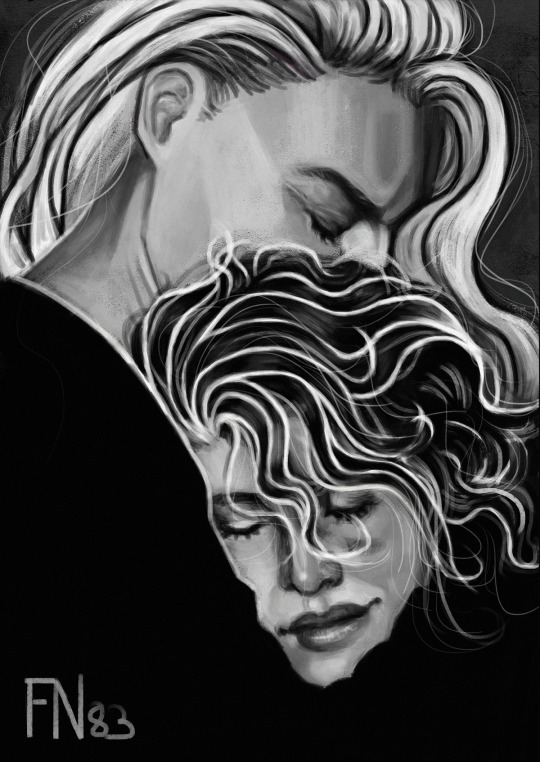
MARIUS de ROMANUS APPRECIATION WEEK DAY 4
-Husbands- whispers and souls: Marius/Armand
#marius appreciation week brought us many things#among them for me was permission from two beautiful artists#to write stories against their glorious art#marius de romanus#Armand#Marius/Armand#vc shitpost
119 notes
·
View notes
Text
On Villain Impact
SO, Guess who just rewatched UP so that I could further expand on the tea brought up in the post that ask prompted! I mean, and some general comparison moments... with plot and tone and the possible inspirations... BUT--
We're not here to explore Paradise Falls today!
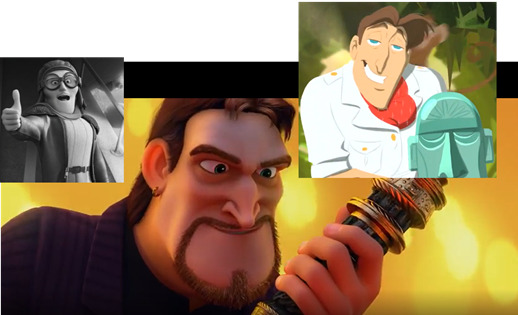
So let's take this in parts so I can give each villain(and one bonus) their dues. Starting with the Pixar villain who first traumatized me in 2009.
Charles Muntz
Sooo first of all, this guy is terrifying.
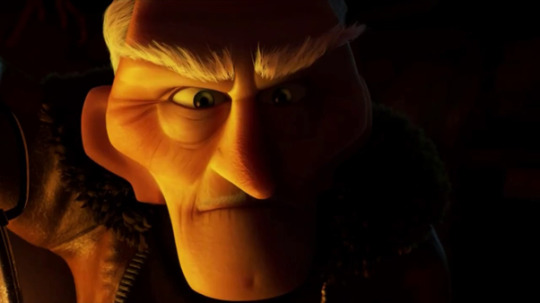
Like, out of all the villains I'm here to talk about, Muntz has reached that point that there's just... something wrong and broken by the time he actually shows up on screen in his movie. Well, not his movie but-- By the time we meet him, isolation has done a number along with his single minded focus on his goal.
Muntz is... not in a good state of mind AT ALL.
BUT--
I kind of want to take it back for a moment to what triggered this. Because here's the tea-- As we see, throughout the movie with Russel and Kevin, Muntz's find was real. Birb still around even. That skeleton he displayed-- and yet--
They decried it as fake. Something he fabricated. Which hello, here's some of my related tea-- Again, this is basically that whole-- issue of if it doesn't fit with known facts, along with some of the other issues regarding the palaeontology community in general that is-- not quite the same, but--
I have many, many dinosaur issues and some of them come from how long it took people to accept feathered dinosaurs, to the fact that there has been multiple cases of evidence that dinosaurs went extinct much more recently than what we're taught in schools(middle ages, medieval art and designs and just argh--), that are just-- REJECTED. Which even included a report about still images, art and designs that are very dinosaur in nature. Or hell, the comparison of dragon legends to how dinosaur skulls and appearances are--
Not to mention there have been and are still fiascos about dinosaur bones and the whole marrow and blood cells discovered in them. Which instead of maybe assuming that means they're younger than previously assumed they're assuming that means that decay rates are off, which... yeah sure. I don't really have a degree on that, but it sounds wrong when decay has more clear and obvious examples that have been more clearly witnessed, studied-- I mean there's a whole STUDY on decay--
BUT I'M NOT AN EXPERT AND THE EARTH HAS TO BE--
Anyway-- Fossils and bones have-- such a HUGE mess. From exhibits going missing, discoveries passed over time and time again because is "doesn't fit" what was previously know, there's a whole documentary that's one guy trying to explain how there's evidence of specific species actually just being sexual dimorphism and differences in age of just one species and being mocked by the rest of the community for that view--
You know fascinating stuff--
Among other things, like I remember so clearly a documentary that used to be around where they talked about a dig site where there were modern animals preserved with animals from so, so long ago-- along with trying to explain how the very existence of Dinosaur bones and fossils proved that the Great Worldwide Flood happened.
Which-- honestly on the flood, just look at how pretty much every culture has a Great Flood story and that's already proven that something happened. WHICH is all beside the point--
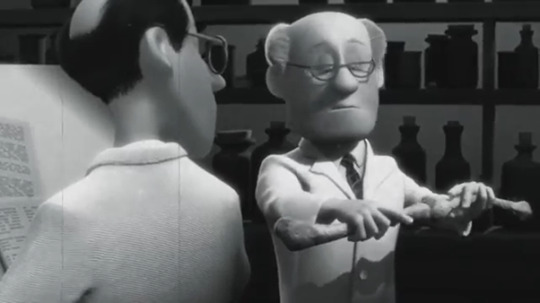
But this-- THIS--
Do you know how much this happens, happened, and still probably will happen in the future?! I mean shit-- people thought the KANGAROO was FAKE NEWS once upon a time. Among-- many other of Australia's animals... also like-- think about weird animals from your own country and imagine in the olden days, sure people could travel, but that didn't mean everyone would or could and just--
How many animals sound fake but then you see them?!
In any case, there's just a very subtle background flow to this movie in that ultimately, the TRUE villains hidden in the story are the Archaeology & Palaeontology communities. Scientists.
--
Which yeah, deviation from the main point of this post, so now that we have that background detail and rant. What impact does Muntz have as a villain. Well... very clearly he's terrifying. Like, I don't think I can overstate how much I was FREAKED OUT as a baby 11 year old seeing this movie for the first time, with exaggerated memories of fire and trauma and all-- and just-- Muntz is a Pixar villain.
Which yeah--
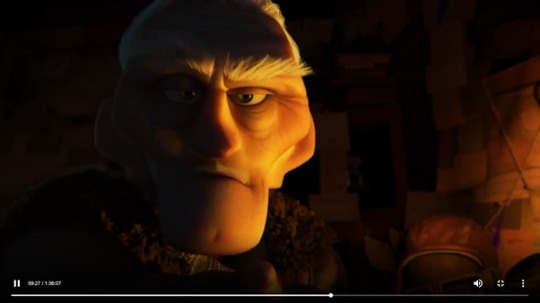
I don't actually really have to say much in regards to how he lingers and his presence is felt all through how the movie unfolds. Even from before this reveal-- there's that sense of wrongness when you're paying attention and you just think about how the dogs act.
And well-- there's something to be stated about this scene... and how it serves as a good lead in to the next villain I would like to talk about-- But for now...
Muntz' degeneration here is subtle. Traitors, liars, people after his discovery... and some serious isolation induced paranoia.
But the heart of his motivation is that long, long ago disgrace. It's been YEARS, of hunting and trying to find the one thing. Carl's entire lifetime from childhood. His entire goal-- and what a hell of a broken pedestal that creates... but arguably, he's from a somewhat tragic perspective when you actually think how fundamentally broken he's fallen when examining the facts.
From a lauded explorer-- adventurer... to this.
Fearing and calling anyone he meets liars.
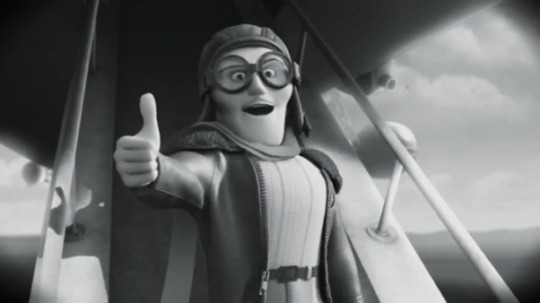
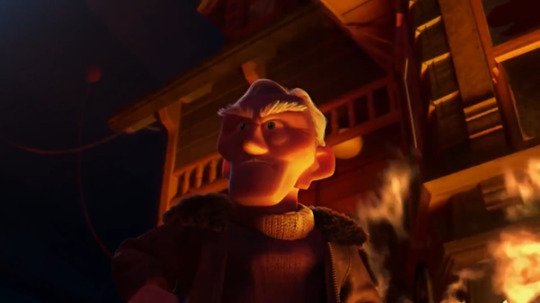
Max Mordon
Soooo before anyone says that was an abrupt-- I think that this is the PERFECT place to transition over. Because the one immediately there is... some DRASTIC contrasts between these two, despite well. Some small similar vibes to generals.
Like seriously...
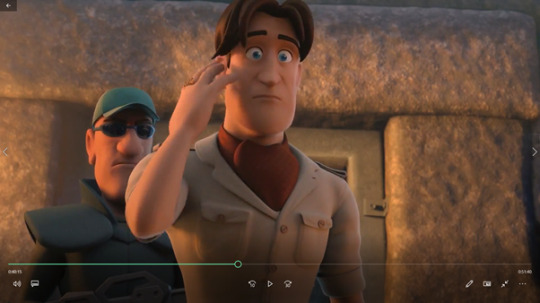
Not precisely the same... but like-- Brown hair, blue eyes... and the general frame of his hair style. Max just missed some of the points and has no moustache or anything. BUT--
Max is also in direct contrast in regards to motivations. At least to the prior villain of Muntz. BUT-- Max is kind of literally the kind of people that Muntz was paranoid about. Which isn't really played for subtly in the movie, which is unfortunate, but to be fair that's a hard thing to play subtle and with all the tropes we've been exposed to nowadays-- BUT--
Max basically fell into the trap of, pedestal to break, along with what I kind of call Scooby logic, in how his presentation gave him away as a villain. And also all the older mentor characters disapproving of him.
Basically he was doomed from the framing.
Which-- isn't really the movie's fault, and in the end I would argue it actually plays to his favour to be so obvious.
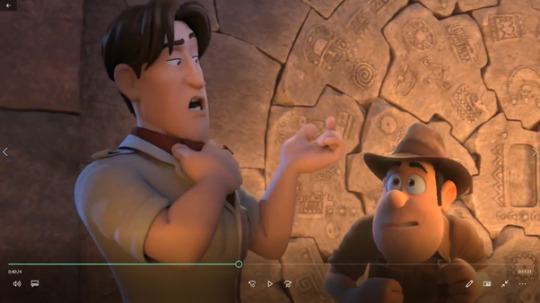
Sooo I can also actually focus on other things instead of the fact we all know! Like how THERE'S just... so, so much I could say about Tad's reactions to Max throughout the movie. But that will probably take away from the focus of this rant/analysis. BUT-- Yeah, Max is set up as pretty obviously trouble to EVERYONE but the main characters.
Which... I do have opinions for another rant about how Sara would have in any other context probably noticed his fake sooner-- but Max is... "media circus" and archaeology... and more really his pursuit is-- really, really straight forwards in the context of the movie and even the greater scope.
Max is after immortality, power, and prestige. Puts great pride on his title and claim to be the "Greatest explorer". And much unlike Muntz there is no sign of ANYTHING tragic or forgiving in his background. He wasn't screwed over by the system, rather he's here using the system to screw others other.
ALSO--
Max is savvy as anything.
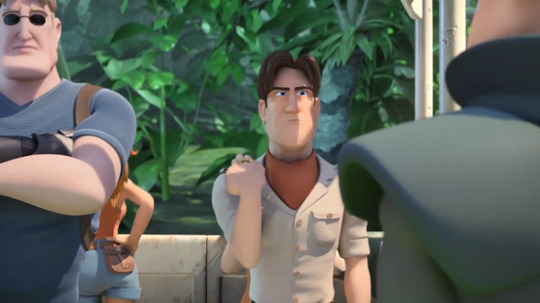
Like-- I don't think people will quite understand my glee at how RUTHLESS this is. But in a similar vein to Muntz, Max isn't letting anything stand in the way of his goals. Not here-- directing the Odysseus to get rid of Freddy and Tad despite them ostensibly being "no threat", which yeah... not completely for Tad as later that comes back around-- BUT-- Max is just... SAVVY in that sense that he's not taking risks.
BUT then we also get him showing he's... really not as expert as he plays himself. Which sure, the Professor has studied for years, but still-- there's a kind of logic that's just-- well, in the Quipu room and even before entering the ruins... He's just-- not studied enough, or observing enough. Not without blind spots.
BUT--
I also want to for a moment just take a moment to have an aside on this:
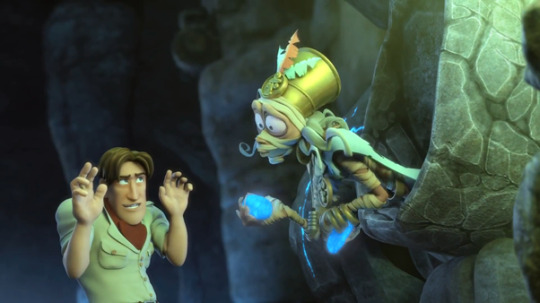
I also don't know if this is something that people would notice. But-- when it comes to this moment, Max turns the tables... really quickly. Which half of that is just Mummy being kind of naïve himself here in this moment, like-- of all the decisions... but the other half is SOMETHING clicked in Max's mind on this--
But mostly I want to focus on that expression. He's so damn smug-- like he's got a plan, smug and smooth, ready to try and steal the advantage... and I have... opinions on other nuances that might be hiding in that smile. But-- well, it's just not something that can easily be covered all in this--
BUT
It's these two SIDES. And his clear motivation, that actually makes Max a really, really strong and interesting villain to speculate and think about. ALSO-- On the topic of my prior rant...
Max DEFINITELY is the kind of person who probably-- had the movie not unfolded as it did, just be likely to think Mummy was just "another discovery" and tool to use to boost his own reputation.
But as we all know-- ultimately it all came back down on him and backfired.
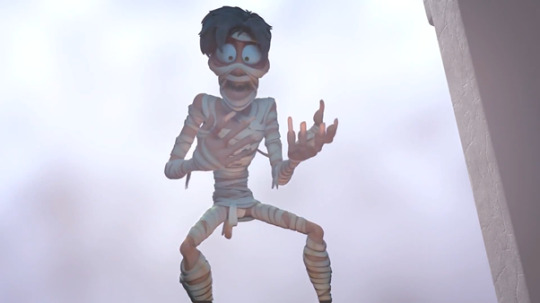
Jack Rackham
Is honestly the most bland and kind of... confusing almost part of The Secret of King Midas. Like, I almost get him, but then compared to Max, there's just... Nothing to really work with in terms of fanfiction for missing scenes, alternative takes on the universe and story-- and even for his basic motivation it feels like something is... missing or unexplained. Not quite paid off properly.
But then, a lot of things in the sequel kind of pan out in a weird way that I have... much to grumble on.
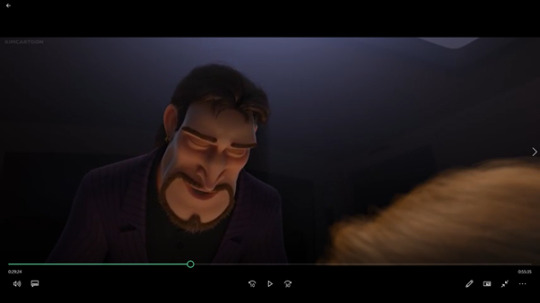
"So cute, the power of Midas goes way beyond wealth my dear"
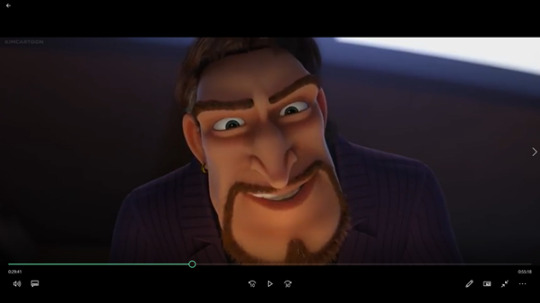
"Midas' power, is the power of the GODS! The power to Rule the World!"
Aaaand then this feels like it doesn't actually get a proper explanation or framing or anything to explain what that even MEANS. It's kind of nebulous to how things pan out and unfold. Also, just in general for movie 2, we didn't see enough of Rackham for him to make a proper impact or landing...
Like, for all the world aside the romance subplot, Rackham's presence in this movie is the MOST FORCED THING. He just feels... incomplete, or like something is missing. And then worse, obligatory. With next to no impact aside a few expressions that only lead to more internal confusion and screaming because WHAT DOES THIS EVEN MEAN?! What was meant to be going on here?
And that stupid, stupid line--
Makes me wonder if there was some other factor supposed to be at play with the collar. Since honestly-- Just the touch of gold doesn't really speak highly to "the power of the gods".
Rackham... in comparison to Max is just-- so empty.
And again...
The last thing that just drives my confusion(along with a conspiracy based on framing, set pieces and other things) is this expression, and specifically who it's aimed at.
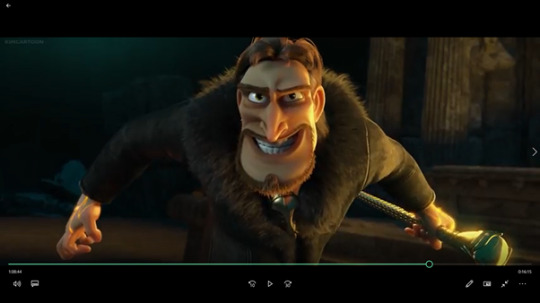
Bonus Tiffany & The Archaeological Community
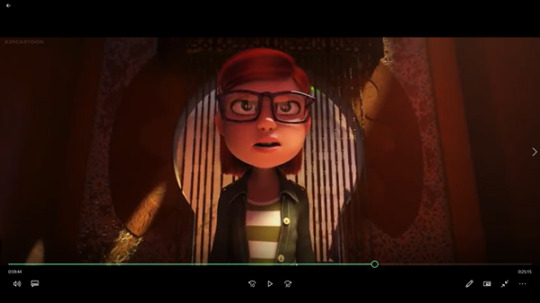
So...
Hot take but-- Movie 2's villain should have been Tiff. Well, halfway anyway... And I have... already mostly ranted on the topic-- But not really enough to truly kind of get over my TRUE frustration. Which has now combined into how nebulous and almost... overloaded movie 2 feels the more I rewatch the rest of it.
BUT LIKE--
If there is one rule that we see time and time again when discoveries are made that challenge things. THEY ARE NOT ACCEPTED. People just like to think, to believe that we know the most about the past already. That there's a strict timeline to everything that happened. And if mythology and stories come into it-- Just for crying out loud--
The issue persists.
People denying anything that challenges the view already established. Up to and including the mishandling of archaeological digs and finds. Destruction of artefacts and we all know that the ones who get the brunt of it are the younger folks, those who're out of the "default" and well... ladies.
Which yeah-- not really surprising because sexism still stands and rings strong... but here...
DESPITE THE PAPYRUS BEING FOUND-- We didn't actually get to see the end result of that... And how it was taken beyond a giant presentation. There would have been authenticators-- people going over every INCH of that thing and then more-- so, so many people who would STILL call it fake.
Since we all know! Magic isn't real, myths didn't happen. So this must be some exaggerated story as well right?
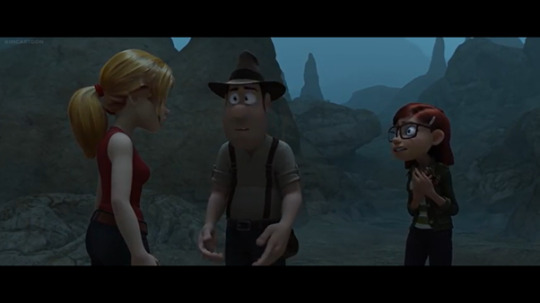
WHICH ALSO-- Arguably this whole angle, the potential of the plot being just-- Driven by this-- It's more in line with the motives that are set up for Tiffany. The BIGGEST DISCOVERY in recent history. And also again, I can talk about some incomplete arcs, because this actually gives EVERYONE that little bit more room to breath.
Also serves as a bit more of a move on from movie 1 for Tadeo, first his hero(Max), wasn't all he appeared, and now-- the villain is okay, not exactly defined so much, more abstract in the community decrying the evidence. Denying-- Quite likely mishandling the papyrus since it can't really be what it claims.
Actually make the papyrus relevant, along with Sara's journal of notes on the project for more than one scene... and POSSIBLY EXPLAIN THAT LINE FROM RACKHAM.
Power of the Gods... and the mystery of Sara's kind of echo/response line to it.
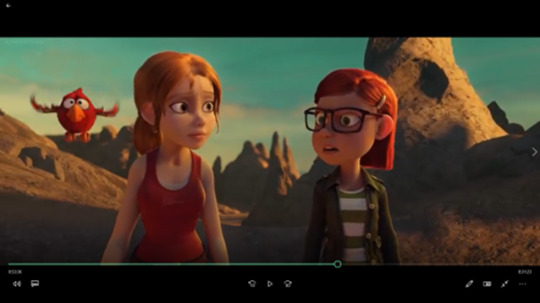
“There are too many signs that the power of Midas shouldn’t be trifled with, I’m just saying that maybe the collar shouldn’t see the daylight”
We could have even still had that climax, just with some alterations, and let Tiffany come full circle in the theming. Set up and payoff, with even the legend being mirrored. But anyway... yeah.
Just in general, the villains most effective here are the ones who give us more than just that surface level empty sense. That have presence that's felt and echoes throughout the whole MOVIE and story. Which is definitely Muntz and Max, without them something is fundamentally lost.
Meanwhile Rackham is there, but he feels obligatory, without a proper explanation and if you removed him--
Tiffany could have become a mirror to Muntz in a similar way to Max-- BUT also much closer. She's set up PERFECTLY for it as well. Her adoration and eagerness, that bright hope yet. And it would be so easy to still have the main beats be the same-- Without much of an issue of the plot push either.
Rackham's sense of presence in the movie is so... dismal anyway--
And as for that climax. Well, you have to prove every aspect right?
BUT then it wouldn't make sense for Tadeo to make any kind of sacrifice there. To come full circle, it would need to be Tiffany. And the collar ACTUALLY could be sacrificed like in the legend and Tad first assumed.
#THybrid Jones#Pixar#Up(Pixar)#Tadeo Jones#Max Mordon#Rackham(Tadeo Jones)#Tiffany(Tadeo Jones)#Charles Muntz#Villains#This is filled with salt tbh#Because I wanted to RANT#But also I got to expand a bit on some things that bothered me#BUT NOT ALL OF THEM#Because I need to finish a certain fic so I can frame some of my posts properly#There are two moments cherry picked in this post I want to rant further on especially#But only one I'm sort of halfway able to
8 notes
·
View notes
Text
Hiya!!!!! @raiswanson tagged me in this, 20 questions to ask your OC. So I’m gonna do everyone’s favorite Talis, the dragonborn paladin himself!!! This is Talis as he is as of the latest short story that I’ve posted on AO3, so to anyone who knows things that happen later, that’s why said things aren’t brought up--this is the newest and freshest of Talis available :3 Fresh out of backstory and into the big city! Prepare yourselves for a lot of uncertainty aLSO HERE’S HOPING THE READ MORE WORKS, BECAUSE THIS IS LONG
1) if they could choose a new name, what would they choose?
Oh! Huh, I uh…. Well… I don’t really know. I… don’t think I’ve ever thought about it, to be honest. It doesn’t… really matter, what I’m called. The name I have is fine [Talis shrugs] I don’t really need a new one
2) what’s a surefire way of making them happy?
Ahh, I’m sorry, I…. I’m… not really sure [He rubs the back of his neck and offers a small, sheepish smile] I’m not doing that well at these questions, am I? Uh… Really, all I need is, uh, I guess down time? When everyone can just sit and rest a bit?
……
I think I used to knit. I think… that, used to make me happy
(happy is kind of a tricky thing for Talis, rn, and he doesn’t know how to handle it. Things like hugs or shared snacks or warm, quiet evenings by a crackling fire would make him happy, but also would make him feel a lot of other things at the same time. It’s complicated)
3) what’s a surefire way of making them sad?
Oh, well, the, yknow, pretty usual… I mean…. It’s the… um…
[He’s rubbing his arms and stares off to the side. Shrugs, rubs his arms, shrugs again]
(The answer is a lot. A lot makes him sad)
4) what do they do when they feel sad?
I… [he hunches a little, wrapping his arms tighter around him] I uh…. I don’t know
…
I’m sorry, I… don’t have anything else to add
5) how do they choose their friends?
Usually, I don’t [Talis laughs softly to himself] Friendship just kind of, happens. Beings who connect well, or work together, or have something in common. Or… someone who reaches out a hand. When you most need it
That’s the kind of friend I want to be. Someone who’s there when people need me most, who can protect those around me
6) what kinds of food do they like?
I’ll eat just about anything, I’m not that particular. Just as long as it’s filling… and there’s enough of it [he chuckles, but then looks uncomfortable]
(Warm, homey foods--stews and curries, harvest foods, bread. That sort of thing)
7) who is the person closest to them?
That… would be Ace. I met him when I uh… first got to town, I guess? [he smiles] He helped me find a place to stay, and… honestly, I don’t know what I’d have done, if I didn’t run into him. I mean, I don’t really know anyone else here, so… I can’t say I have a lot of folks to pick from? But, yeah, Ace. Yeah
(For the record, Talis would have ended up asleep in an alley somewhere, but eventually found his way to a Temple, and likely have found some kind of work and living space there. But things definitely went a lot smoother, running into Ace, and he feels a lot more secure to have the dragonborn to look up to as he gets his feet under him)
8) what kinds of music do they listen to?
Anything that’s, that’s being played, really. I wouldn’t know what to pick if you… asked… which… ah… [he looks like he wants to sink into the collar of his shirt]
9) if logistics and money weren’t an issue, what kind of animal would they keep as a pet? (includes fantastical animals like dragons as well btw)
I’m, ah, I’m really in no place to… I mean… I don’t think… [he looks about his room, as if looking for an answer] Uh… a… I don’t… think I need a pet…? Really I… I don’t….
(Something low maintenance and soft, like a cat, would probably be good. Maybe a local mouser that he could befriend, he’d love to just sit with a happily dozing cat on his lap ^^ Someday I could also see him getting some kind of pack animal, like a mule, if he has to take to the road with his adventuring party. Even if one of his teammates got a mule, he’d definitely take the time to get to know it and bond with it)
10) what does the landscape of their mind look like?
Uh… [his expression becomes strained] I mean, probably nothing… that interesting…? Like a, yknow, a mind…? I, I don’t know what that would look like…
(His mind looks like a field right before a thunderstorm hits--not as dark as it will be, but dark as night, with a fire in the far distance. A balance of unsettling stillness and precipitating, distant danger
And no, he doesn’t know what to do with it either)
11) why do they like themselves?
Oh, well, um…. [he draws his arms around him] Well, um… I know.... I was called to be a paladin… that… I was chosen. So… that has to mean there was something worth choosing. In me… right?
(this question assumes a character has things they like about themselves, and…. yeah)
12) what do they dream of doing if they had anything and everything open to them?
[he sits very quiet for a length of time] I would… I would ensure… no one would have go through the hell that… [he winces and stares at his hands in his lap. His voice is very soft] I would make sure all had a chance to live well, safely, and freely in the light of the day
13) what fashion choices do they make? do they go more for comfort or style?
I uh… haven’t made many fashion choices lately [he gestures with amusement to his own clothes, which are practical and too big for him, plain workers clothing] I mean, really, whatever’s… available, and sensible for whatever I have to do. Uh… I’m thinking of getting some, uh, gloves soon, it’s, it’s a little cold and… And maybe a, a sweater? Just for days out and about, and, [he holds back a small laugh, looking down at himself] and maybe a splash of color
(Talis loves warm, homespun fashion--vivid marigold and crimson and rich browns, embroidered collars and hems, layered belts and jackets, knitted vests and hats and gloves. Coordinated layers, varying bolder and softer tones, etc… He might decry it, but he loves picking out what to wear, when he actually does take the time to choose what to wear, and doesn’t just go to sleep in whatever he was wearing that evening ^^; Old habits die hard, eh?)
14) if they had to go somewhere without a map, what’s the likelihood that they would make it there without getting lost?
Aaaaaahhh, that would... very much depend on… uh, where this place is…? If I’ve been there…? I, I really haven’t been around, uh, much of Neverwinter yet [he bashfully rubs the back of his neck] I don’t think I could find my way down the street, as it stands
15) what types of people do they attract?
I, um, ah, well… I… I hope I attract people who need my help? So, so I can help them. I’m a paladin, that’s… what I’m here to do
(So far, anyone who’s been around him for longer than half a second has immediately gone “oh no, you need an adult, don’t you?” so mostly: he attracts parents XD )
16) what types of people are they attracted to?
Oh, uh…. Oh. Oh, that kind of….? Ummmmmm….. [his face flushes and he stares at the floor] Um, I really, I really don’t, I… I don’t…. know….?
(Romantically, Talis attraction has been just a giant pile of question marks to me ^^; It’s not something he’s thought much about, and right now, it’s extraordinarily low on his priority list to pursue. He definitely feels some form of draw towards anyone who’s hurt or scared, but it’s more a draw to alleviate that fear/pain than a draw towards the actual person. Yeah, there’s an intimacy to helping another, and he feels it, but that’s all there is, really. He’s got a lot on his plate rn, and isn’t looking for a romantic relationship. He isn’t looking for friends, either, he’s not really looking for anything--he’s just trying to get by ^^)
17) what is their greatest fear?
[his face blanches, and he’s staring at something with unfocused intensity] I……. I……. I don’t…..
I don’t want to hurt anyone [he twists his hands in his lap] I don’t want… anyone to get hurt, because of me
(More specifically, he doesn’t want anyone to use him to hurt others, but he doesn’t really know how to articulate that point)
18) what kinds of body modifications would they do if they could? (e.g. tattoos, dyeing hair, piercings, etc.)
[he idly rubs the scar on his cheek, then pulls his hand away] I hadn’t really thought about that, either… I… don’t know what I’d get… if I could. I don’t really have much to work with here [he laughs and offers a shrugs]
19) what are they insecure about?
I’m… [he unconsciously rubs his wrist] I’m.... I… I-I don’t have time. For insecurities. Thinking… thinking like that just… [he frowns down at his boots] I-I’d rather skip this question, if you don’t mind
(Yes. The answer is yes. He has a lot of them and isn’t ready to admit to any of them)
20) how do they treat people/beings who have less power than them?
You protect them. You look out for them. That’s, that’s just what you do. Anyone who doesn’t look out for those less powerful than themselves doesn’t deserve that power. Then they’re as good as abusing the power in their hands, if they can help another and don’t then they-- Sorry, I, I didn’t mean to…
[he takes a breath]
I swore an oath to protect and aid any who cannot protect or aid themselves. Because that’s. That’s what you do. If you have strength, you use it to help those without
///The boy. The legend. *waves hands jazzily*
Here’s the part where I tag @jcckwrites and @void-tiger and @skairipaassassin and @queenofhelheimr and @linkhecometotown and @maebird-melody and @gryphongirl and anyone else with an OC? I feel like Rai tagged the whole council, but if any y’all are reading this, I’m tagging you again (only it won’t let me tag anyone else so I’LL JUST BADGER YOU LATER)
#paladin talis#talis#dnd oc#oc related#ask meme#this took me way longer than I thought it would#look at my son#if you are new here#i have stories about this boy#on ao3
17 notes
·
View notes
Text
Sonichu 10 Page 91

MAGI-CHAN {narration}: Between each of them, Alec, Evan, Sean and Mao had their own individual executions. After Angelica read them their last rights, they were each set up. For Alec, the ten button electric chair.
CHRIS {thought}: Set me on fire! Chop off my head! You d*** lunatic!
SONICHU {thought}: I am not gay!
WILD {thought}: You killed my sweetheart!
SANDY: You killed my mommy!
BUBBLES {thought}: I am not retarded!
ANGELICA {thought}: May God have mercy.
PUNCHY {thought}: Blood and gore!
PATTI {thought}: I bite back!
BIONIC {thought}: I am not a robot!
ALEC: La-la-la-la-la-la-la-la-la-la-la-la..!
MAGI-CHAN {narration}: Evan hurt Wild and Sandy the most, by wanting Simonla dead first and worse. He is chained to a wall…
With a zap, a whirr, a bang, and a crunch, the Asperpedia Four are ended. Magi-Chan overviews the process CWCville uses to execute its condemned. Notably, it appears that the Asperpedia Four were immediately executed following their trial, as opposed to spending time following their sentence on death row. But Chris and his army of hedgehogs were feeling exceptionally bloodthirsty when it came to the Asperpedia Four, so it’s possible they were granted an exception and immediately sent to their deaths.
The sole shred of humanity they are offered is Angelica reading them their “last rights”, likely stemming from Chris confusing “last rites”, the Catholic sacrament of a final prayer and Eucharist for someone about to die or be executed, with the Miranda Rights, which would have been delivered to them upon their arrests.
Alec is the first to die, and also given one of the longer executions, with ten individuals given the chance to air their grievances with him. Surprisingly, despite being the characters with the strongest in-universe reasons to hate Alec, none of the Asperpedia hedgehogs or the Basement Rosechus are present at his executions.
The first to press a button is Chris, who denounces the violent content in Asperchu one last time, complaining again about the scene where he was set on fire and other abuses he received in Asperchu. He is surrounded by red plus signs, used in anime to represent anger.
Sonichu’s complaint? “I am not gay.” Which is a strange complaint, as Sonichu is not portrayed as gay in Asperchu, Wild was. While Sonichu’s interactions with Asperchu are often played up as homoerotic for laughs, they are never a couple.
Wild and Sandy both decry Alec’s role in the removal of Simonla, as well as her in-comic murder. Sandy is notably the only person present to actually say aloud her grievance, as opposed to thinking it.
Magi-Chan says nothing, but emits a violet shock wave that reaches Alec as he dies at the bottom of the page (note the purple lines above Alec’s head). It’s possible that this was a telepathic message aimed privately at Alec, but I’d argue that if that were the case, Chris would have noted what he said. My head canon is that Magi-Chan has the power to murder people using his psychic powers, much as we see Chris do to Mao, and here Magi sends out a psychic shockwave specifically to kill Alec (though it’s so slow that it doesn’t reach him until after the electric chair has been activated, making it a pointless endeavor).
Bubbles, with Blake by her side, takes issue with Asperchu playing up her stupidity for laughs. Bubbles was portrayed as exceptionally stupid in Asperchu, so stupid she could barely function.
The sole thought racing through Angelica’s mind is “May God have mercy”. It has long been debated who Angelica means when she says this - Chris presumably meant that Angelica wished God(bear) to have mercy on Alec’s soul, as he was (in Chris and Angelica’s eyes) a murderer, but it is commonly thought in the fan community that she was asking for her own forgiveness, and that she felt immense guilt over her role in Alec’s execution and now believed herself to be an accessory to murder.
Punchy apparently hasn’t been watching enough TV comedies to calm his temper and, surrounded by more angry anime marks than anyone else, shouts “blood and gore”. It’s subtly suggested throughout Sonichu that Punchy may have some anger management issues, and for a page, the story lets Punchy fulfill his most violent fantasies.
Patti’s presence is confounding to anyone who hasn’t followed the Asperchu saga to its every detail. See, in Asperchu, there’s this one off dog that’s white and brown and wears a green bandana, Chris assumed it was based on his comic incarnation of Patti and took immense offense with Alec including his real life dog in his comic. The dog only superficially resembles Patti, being a non-anthropomorphic quadruped, and is an easily missed character. But this character is the basis for Patti’s continued hatred of Alec and Asperchu, including the claim that she can and will eat Alec’s soul, and her presence here. Again, let I remind you that Alec apparently abused all of the EHPs in his care for years, yet Patti is the one who is deemed to have the greater misdeed done against her.
The character who completes the lethal circuit is Bionic the Hedgehog. In Asperchu, Bionic was a diabolical hybrid of Christopher Pike from Star Trek and Davros from Doctor Who, though Bionic was not a robot. He was a normal hedgehog, but was severely injured by a curse-ye-ha-me-ha and was stuck in a wheelchair/life support system like the ones Pike and Davros use. Chris has always taken offense to the suggestion from anyone that Bionic is mechanical due to his misleading name, though.
And with that, the electric chair is activated and begins to light Alec up. His last words are the embarrassing “La-la-la-la-la”, even though he easily could have just said “Aaaahhhhh”. The phrase “La-la-la-la-la” is, at least in the stuff I’ve seen, heavily associated with skipping merrily, and frequently with little girls skipping merrily. It’s a pretty embarrassing thing to have as your last words, honestly.
And as Alec’s corpse slumps back in the chair, charred and smoking, Chris’s confirmed body count in Sonichu 10 rises to one hundred and three.
#Sonichu 10#Director Amenities#Christian Weston Chandler#sonichu#Rosechu#Blake#wild sonichu#bubbles rosechu#punchy sonichu#angelica rosechu#magi chan sonichu#bionic the hedgehog#Patti Chandler#sandy rosechu#alec benson leary
17 notes
·
View notes
Text
Colonialism
You back into things sometimes.
One of my many guilty pleasures is old school pulp, which I first encountered with the Doc Savage reprints in the 1960s, then old anthologies, then back issues at conventions, and now thanks to the Internet, an almost limitless supply.
And to be utterly frankly, a lot of the appeal lays in the campiness of the covers and interior art -- brass plated damsels fighting alien monsters, bare chested heroes combatting insidious hordes, etc., etc., and of course, etc.
Once past age 12, I never took these covers or the covers of modern pulps such as James Bond, Mike Hammer, or Modesty Blaise seriously; they were just good, campy fun.
While my main focus remained on the sci-fi pulps, I also kept an eye on crime and mystery pulps, war stories, and what are sometimes called “sweaties”, i.e., men’s adventure magazines.
Despite the differences in the titles and genres, certain themes seemed to pop up again and again.
Scantily clad ladies, typically in some form of distress, though on occasion dishing out as good if not better than they got.
Well, the pulps that drew my attention were the pups made for a primarily male audience (though even in the 1930s and 40s there were large numbers of female readers and writers in the sci-fi genre). Small wonder I was drawn to certain types of eye candy; I had been culturally programmed that way.
That’s a topic well worthy of a post or two on its own, so I’m putting gender issues / the patriarchy / the male gaze aside for the moment.
What I’m more interested in focusing on is the second most popular characters to appear on the covers (and in the stories as well).
The Other.
The Other comes in all shapes / sizes / ethnicities. Tall and short, scrawny and beefy, light or dark, you name it, they’ve got a flavor for you.
“Injuns” and aliens, Mongols and mafiosi, Africans and anarchists.
Whoever they were ”they ain’t us!”
Certain types of stories lend themselves easily to depicting the villainous Other.
Westerns, where irate natives can always be counted on to launch an attack.
War stories, where the hero (with or without an army to help him) battles countless numbers of enemies en masse.
Adventure stories, where the hero intrudes in some other culture and shows them the error of their ways.
Detective stories, where the Other might be a single sinister mastermind but still represents an existentialist threat.
And my beloved sci-fi stories?
Why, we fans told ourselves our stories were better than that! We didn’t wallow in old world bigotry, demonizing blacks and browns and other non-whites because of their skins.
Oh, no: We demonized green skinned aliens.
Now I know some of you are sputtering “But-but-but you wrote for GI Joe!”
Boy howdy, are you correct.
And boy howdy, did we ever exploit the Other with that show.
I never got a chance to do it, but I pitched -- and had Hasbro accept -- a story that would have been about the way I envisioned Cobra to have formed and been organized, and would focus on what motivated them.
They were pretty simplistic greedheads in the original series, but I felt the rank and file needed to be fighting for a purpose, something higher to spire to that mere dominance and wealth.
I never got to do “The Most Dangerous Man In The World” but I was trying to break out of the mold.
For the most part, our stories fit right into the old trope of The Other.
Ours were mostly about the evil Other trying to do something nefarious against our innocent guys, but there’s an obverse narrative other stories follow, in which our guys go inflict themselves on The Other until our guys either come away with a treasure (rightfully belonging to The Other but, hey, they really don’t deserve it so we’re entitled to take it from them), or hammer The Other into submission so they will become good ersatz copies of us (only not so uppity as to demand equal rights or respect or protection under law).
These are all earmarks of a very Western (in the sense of Europe and America…with Australia and New Zealand thrown in) sin: Colonialism.
Now, before going further let’s get out terms straight.
There’s all sorts of different forms of colonialism, and some of them can be totally benign -- say a small group of merchants and traders from one country travel to a foreign land and set up a community there where they deal honorably and fairly with the native population.
The transplanted merchants are a “colony” in the strictest sense of the term, but they coexist peacefully in a symbiotic relationship with the host culture and both sides benefit, neither at the expense of the other.
Oh, would that they could all be like that…
Another form of colonialism -- and one we Americans are overly familiar with even though there are all sorts of variants on this basic idea -- is the kind where one culture invades the territory of another and immediately begins operating in a deliberately disruptive nature to the native population.
They seek to enslave & exploit or, failing that, expel or eradicate the natives through any means possible.
It’s the story of Columbus and the conquistadors and the pilgrims and the frontiersmen and the pioneers and the forty-niners and the cowboys and the robber barons.
It’s the story where different groups are deliberately kept separate from one another by the power structure in place, for fear they will band together and usurp said power structure (unless, of course, they band together to kelp make one of ours their leader, and build a grand new empire just for him).
It’s the story where our guys never need make a serious attempt to understand the point of view of The Other, because they are just strawmen to mow down, sexy lamps to take home.
I think my taste in sci-fi and modern pulp writing in general started to change around the mid-1970s.
Being in the army quickly cleared me of a lot of preconceptions I had about what our military did and how they did it.
The easy-peasy moral conflicts of spy novels and international thrillers seem rather thin and phony compared to the real life complexities of national and global politics.
Long before John Wick I was decrying a type of story I referred to as “You killed my dog so you must die.” Some bad guy (typically The Other) does a bad thing and so the good guy (one of ours -- yea!) must punish him.
Make him hurt.
Make him whimper
Make him crawl.
Make him suffer.
The real world ain’t like that.
Fu Machu falls to Ho Chi Minh.
As entertaining as the fantasy of humiliating and annihilating our enemies may be…we gotta come to terms with them, we gotta learn to live with them.
That’s why my favorite sci-fi stories now are less about conflict and more about comprehension.
It’s better to understand than to stand over.
. . .
The colonial style of storytelling as the dominant form of story telling is fairly recent, dating only from the end of the medieval period in Europe and the rise of the so-called age of exploration.
This is not to say colonial story telling didn’t exist before them -- look at what Caesar wrote, or check out Joshua and Judges in the Old Testament -- but prior to the colonial age it wasn’t the dominant form of storytelling.
Most ancient stories involve characters who, regardless of political or social standing, recognize one another as human beings.
And when gods or monsters appear, they are usually symbols of far greater / larger forces & fates, not beasts to be subdued or slain.
Medieval literature is filled with glorious combat and conflict, but again, it’s the conflict of equals and for motives and rationales that can easily be understood.
It was only when the European nations began deliberately invading and conquering / dominating foreign lands that colonialism became the dominant form of storytelling.
It had to: How else could a culture justify its swinish behavior against fellow human beings?
Even to this day, much (if not most) popular fiction reflects the values of colonialism.
Heroes rarely change.
Cultures even less.
We’ve kept The Other at arms length with popular fiction and media, sometimes cleverly hiding it, sometimes cleverly justifying it, but we’ve had this underlying current for hundreds of years.
Ultimately, it hasn’t served us well.
It traps us in simplistic good vs evil / us vs them narratives that fail to take into account the complex nature of human society and relationships.
It gives us pat answers instead of probing questions.
It is zero sum storytelling: The pie is only so big, there can’t be more, and if the hero doesn’t get it all, he loses. (John D. MacDonald summed up this philosophy in the title of one of his books: The Girl, The Gold Watch, And Everything.)
It’s possible to break out of that mind set -- The Venture Brothers animated series brilliant manages to combine old school pulp tropes with a very modern, very perceptive deconstruction of the form -- but as posted elsewhere, imitation is the sincerity form of flattery that mediocrity can pay to greatness, so while I certainly applaud The Venture Brothers I don’t want to encourage others to follow in their footsteps.
Because they won’t.
They’ll pretend they will, but they’ll veer off course and back into the old Colonialism mindset.
We need to break out, break free.
Here in the U.S. it’s African-American History Month.
The African-American experience is far from the Colonialism that marks most white / Western / Christian storytelling (and by storytelling I include history and journalism as well as fiction; in fact, anything and everything that tells a narrative).
It’s a good time to open our eyes, to see the world around us not afresh, but for the first time.
Remove the blinders.
I said sometimes you back into things.
Getting a clearer view of the world I’m in didn’t come from a straightforward examination.
It came from a counter-intuitive place, it found its way back to the beginning not by accepting what others said was the true narrative, but by following individual threads.
It came from Buck Rogers and the Beat Generation and Scrooge McDuck and the sexual revolution and Zen And The Art Of Motorcycle Maintenance and the civil rights era and Dangerous Visions and the Jesus Movement and Catch-22 and the Merry Pranksters.
It came from old friends, some of whom inspired me, some of whom disappointed me, and yet the disappointments probably led to a deeper, more penetrating insight into the nature of the problem.
This Colonialism era must come to a close.
It can no longer sustain itself, not in the world we inhabit today.
It requires a new breed of storytellers -- writers and artists and poets and journalists who can offer
It’s not a world that puts up barriers by race or gender, ethnicity or orientation, ability or age.
There’s ample opportunity for open minds.
All it asks of us is a new soul.
© Buzz Dixon
#colonialism#morals#ethics#philosophy#history#Black History Month#how this writer's mind works#GI Joe
10 notes
·
View notes
Note
I don’t think it was wrong for hiccup to put his first best friend toothless over his people. Because I would do the same for my dog. Animal lives are far more important then human lives. Humans are horrible so why should someone who got bullied his whole life care about the people who tormented him over an animal who actually cares about him and doesn’t judge him. Humans judge you animals don’t. Thoughts on this?
Seeing a discussion topic like this gives me immediate flashbacks to my undergrad in Philosophy and those Ethics courses. XD
There’s several things that pop into my head about this ask, since you’re bringing up multiple topics that could be debated in depth ethically. I want to make several things clear in my response before I get the ball rolling:
I may be wrong, but you, friend, sound like someone who lives life through your heart. If so, I imagine that means you find emotions and feelings extremely important, and these are used to guide your life choices. It’d be the framework by which you see of the world. Your perspective is valuable and beautiful. I do want to make you aware, though, I’m on the opposite end of the spectrum. I’m not able to respond to this question with the same emotive values-based discussion because I think differently. I navigate the world with a logic focus. The fact the two of us differ and have different ideas about us is beautiful! Please understand none of what I say will be dismissing, devaluing, or decrying your perspective, just supplying my own alternate framework.Now, sometimes people talk about ‘cold logic’ as though it’s separate from morality, but I believe logical choices require conscientious moral judgment. If you ignore morality when you make a choice, you’re not being logical because you’re not taking all important factors into account. This means that my discussion will be a LOT more logical than you probably think about this topic, or expected me to handle it. But this is the way I can respect and tackle the ethical questions!
Interesting as the topic is, I don’t want to turn this into a back-and-forth discussion with anyone. But I do want to point out before I provide my thoughts: different ethical schools of thought have existed for millennia for a reason. Ethics is an extraordinarily nuanced topic and ergo, hard to arrive at a definitive “answer” for, even when we’re all acting out of love. And frankly, ethics is a topic I think humans are incapable of fully understanding.
As you discuss it, animals are worth more because you see them as morally pure. Humans, however, have moral failings and can do terrible things. The people of Berk hurt Hiccup, which makes them less valuable to you.
To me, this brings up three big relevant questions:
Is someone’s value based on their morality?
Can we judge animals on morality in the same way we do humans?
How immoral were the Hairy Hooligans?
But the final concluding remarks I’ll have (see Read More) will be looking at THW. I’m not 100% sure which part of canon you’re discussing, but since THW showcases Hiccup needing to make a choice between staying with Toothless or becoming a human leader apart from dragons…
In THW, it’s not a strict matter of putting animals or humans first. Either Hiccup hangs out with Toothless and puts both species in danger, or Hiccup gives humans and dragons and Toothless what is best for everyone. And if Hiccup wanted to stay with Toothless, he’d only be making a choice based on his own happiness, not on whether or not he’s actually helping his friend (Toothless will have a happy life even if he leaves New Berk). In the end, Hiccup’s two moral options mean his outcome is either “happy” or “less happy,” but the results for everyone around him is “saved” or “condemned” to war and possible death. And choosing a preference of happy vs unhappy instead of life vs death to me is something I wouldn’t call ethically responsible. Hiccup putting the people of Berk first before hanging out with Toothless is something I’d call the right choice.
The first question is one I care about a lot personally. It’s deep in my values, I mean. You don’t have to agree with me, that’s chill, but again: the reason different ethical frameworks exist is because ethics is complicated! XD
I have strong beliefs that all lives are inherently valuable. As I believe, neither productivity in society nor ethical choice changes the fact lives are innately valuable. When someone is evil, the reason that is disturbing isn’t because they’re “automatically bad” and “born horrible”; it’s because they have a valuable soul that they corrupted through their unseemly life choices. All of us are human and all of us err. All of us could have lived a life purer than we did, and all of us could have descended to worse evil than we did. We all have within us the potential to be horribly evil, and we all have within us the potential to be a thoughtful and considerate soul. Our value doesn’t wax and wane as we calculate our ratio of sins to virtue, because the tragedy of the sin is that our innately valuable soul is being used for evil instead of the good it could do.
This is also coming from someone who hates the idea that people “deserve” to have bad things happen to them. And I am also someone who hates ideas of revenge or “getting back at someone.” If a person hurt you, they hurt you and that’s wrong, but that doesn’t give you the right to stoop to their level and hurt them back. You’re just repeating what they did and making yourself as bad as they were in the first place. That’s petty and cruel. (Note: this is different than discipline, which is done with an intent to curb dangerous effects for someone’s actions, and to correct behavior to help someone grow.)
Humans can be horrible. Unfortunately, you’re right. Our species can be awful. I think that’s why we need to take actions to help our species grow. Helping other humans is a step we need to take to make society better and less horrible. The more we make choices to help people, the more we fight back on the horrible things humans do to one another - then in turn, the more we prevent those things from happening. For some, they’ll keep being evil. But for many others, they’ll be taught how to be better, and as they grow, they’ll become more acting agents working to make the world a better place. It’s to note that, in many cases, people make horrible choices because they were victims and weren’t put in an environment where they could fully learn to act healthily; this is unfortunately why abuse may continue generation to generation in families. Kids grow up to enact the same abuse their parents did to them. Ergo, someone can be both a victim and a perpetrator. Instead of condemning that behavior as an indicator of evil in human society, and say these people deserve to be left behind… I’d rather step in to prevent the cycle from continuing, and give the next generations a chance to grow and live happier, healthier, kinder, and more compassionate lives.
Hiccup abandoning the Hairy Hooligans makes no social progress and doesn’t give humanity a chance to grow to be better people; Hiccup helping the Hairy Hooligans does good work. This isn’t to say we’re morally obligated to help everyone who does a wrongdoing (we’re not), but it is something to keep in mind before we say that someone should suffer and/or be punished because they’ve done wrong.
And I think that Hiccup being the chief of Berk makes him especially responsible to them.
So for me, I don’t think that the Hooligans’ behavior toward Hiccup is any excuse for letting them suffer. The world is a better place by preventing a cycle of more suffering, not perpetuating it. And in the case of Hiccup’s conflict between him and Toothless, this is a matter of saving lives from an upcoming war - a pretty big deal.
But my ethical opinionating here can be sidestepped through the other two questions I raised. Whether or not you agree with me here, I think we can look at two other relevant angles fresh.
The second question deals with how we judge animal morality. I’ve heard debaters mention dolphins save lives and murder people, suggesting moral behaviors akin to humans. I’ve seen people talk about how dogs show guilt after they’ve done something they know will bother owners. I’ve seen people point out that whether or not humans can morally kill to eat meat is different than discussing whether or not carnivores like lions (whose entire biology requires meat) can morally kill to eat meat.
But honestly for me, I think it’s comparing apples to oranges, and we get nowhere by trying to put a human framework on a species that isn’t human. I don’t want to project my human values on their behaviors. Dogs, lions, and dolphins won’t have the same internal psychology as me on account of them being different species. I can’t judge a dog for acting like a dog because I can’t be a dog knowing how dogs think through choices.
So to say that one creature is more valuable than another on account of their moral perspectives… to me is impossible to do. To say one species deserves suffering more than another frankly bothers me. (And yes, that includes ants, spiders, snakes, and wasps. I squeed happily when I saw a snek the other night - what an adorable cutie
The third question I think is the most relevant. How much wrong did the Hairy Hooligans really do to Hiccup? And are they irredeemable for it?
Hiccup felt ostracized from his tribe because he couldn’t kill dragons like they could. He didn’t feel like his father respected who he was, and was hurt by some of the things Stoick said about/to him. He was taunted by peers for being a screw-up. The adults of the tribe could speak harshly to/of him, too.
Now, I don’t want to defend the people of Berk in their bad choices. I don’t think it’s okay to mock your peers, for instance. I don’t agree with disowning a kid ever. But at the same time, I think it’s important to look at both sides of what went down in Hiccup’s situation in HTTYD 1.
1. Hiccup is not innocent. Hiccup’s struggles are understandable. He wants to fit in in a society that’s filled with dragon-fighting Vikings. He wants to be a dragon-fighting Viking too because that means he’ll no longer feel like the odd one out. The desire to fit in and be respected is especially prominent in teenaged years. Teens want to fit in badly, and they can emotionally struggle thinking “I’m different and no one understands or respects me.” Ergo, Hiccup wants to murder dragons, JUST like everyone else.
Hiccup’s desire to fit in with a warrior culture is so strong he makes VERY BAD choices. Hiccup repeatedly charges into battle. Hiccup is an untrained teenager who shouldn’t be in a dangerous dragon fight. He’s a liability, not just for himself, but for everyone in the village. He can make the battle harder for the fighters, and he can put himself in harm’s way so that now others have to save him. Hiccup trying to fight dragons is outright irresponsible, and puts not only his own life at risk, but the lives of the adults around him. I can sympathize with him wanting to fit in and prove his worth… his emotional pains are relatable… but he’s going about it the wrong way. Trying to fit in by putting others’ lives in danger is not okay.
There’s a reason the Vikings of Berk are annoyed at this kid. Hiccup is repeatedly instructed not to put his and their lives in danger. He keeps doing it, putting his selfish insecurities first and their safety last. When the Vikings grumble, it’s because this kid is making bad, selfish choices.
And let’s be real: it’s not so different a world where Hiccup could have killed Toothless with his first shot. And if he did, would he have become a repeated dragon killer like the others? He’s living in a culture where that is the norm, and his desires (as evident in the start of the first film) show he’s not separate from his culture. A unique set of circumstances was what allowed Hiccup to stare deep into Toothless’ eyes, reflect on what he was doing, and make a choice to be different (a hard choice that he derided himself for, and only grew to accept as his friendship with the dragon grew).
2. They’re at war. The Hairy Hooligans do not know about the Red Death. They don’t know that the dragons are being forced to raid the village. All they know is that their livestock, their homes, and their lives are in jeopardy because enormous winged beasts attack them. The dragons are attacking their settlement, not the other way around. The Vikings have never made it to the dragon nest and the dragons’ environment, but the dragons appear to be the aggressors.
The Vikings, as far as they can understand their situation, are defending themselves. They’ve had to learn to fight dragons to stay alive.
In the middle of a war, a kid comes up to you and says the enemy’s okay. How easy is that going to be to accept? Especially when the Kill Ring turns into chaos, and both a Night Fury and a Monstrous Nightmare are fighting humans?
Hiccup might be trying to show them that dragons aren’t what they thought, but to be fair, most wars don’t evaporate when one kid tells you everybody can be friends. For generations, the dragons have been a proven aggressive threat.
The Hairy Hooligans killed dragons. The Hairy Hooligans were very harsh when Hiccup stated that dragons weren’t the enemy. That’s not cool… but in this sort of circumstance, isn’t it easy to see that the people of Berk could see Hiccup as a traitor putting their lives in danger? A society that’s trying to defend themselves from death… is in greater threat because this wild kid is bringing up a wild idea that’ll probably lead to more death.
Is that actually widespread thoughtless bullying?
3. Parenting is HAAARD and the entire plot of HTTYD is a rift between father and son BOTH being imperfect. Stoick said a few harsh and unwarranted things to Hiccup, but in many cases, Stoick was doing his best with what a father should do: calling out his son for bad behavior, and trying to connect in positive ways. Stoick is not a Bad Guy Dad. He and Hiccup have a rift that makes it hard to understand and communicate with one another (but the difficulties go BOTH WAYS).
Stoick does live in a society which values dragon fighting, and Stoick (as a good dragon fighter) values it a lot. Hiccup understands that and knows his father will respect him if he fights dragons. While Stoick would be ecstatic for his son to exceed in the warrior ways, he’s also not a father PUSHING his son to be a fighter. In fact, he protests when Gobber suggests Hiccup goes to training… Stoick doesn’t want his boy hurt. When he fans over Hiccup being chosen to kill the dragon in the ring, it’s because he thinks his son is already a fighter.
We can understand why Stoick makes the choices he did, and even though they’re not 100% perfect, they’re also understandable things that a caring parent does in difficult situations with difficult kids.
4. People change. AND THE PEOPLE OF BERK *DID*.
Hiccup got taunted by Snotlout, Ruffnut, and Tuffnut for being a screw-over. Now they’re his best friends and help him save dragons. Hiccup was dismissed as a nuisance by the tribe when he was a teenager. Now the tribe cheers his name and accepts him, with pride, as their leader. Hiccup was considered a problem because he wanted to befriend dragons. Now the tribe’s ENTIRE CULTURE changed because they realized the boy was right, and the entire tribe has taken on the duty of trying to protect, save, train, and befriend dragons.
You’re right that Hiccup got bullied and hurt by his tribe (I doubt this was his whole life, and I doubt it was the whole tribe, but yes, Hiccup had some bad interactions happen). But that’s not how it ended. The people of Berk profoundly revolutionized their society because they came to respect Hiccup’s ideas. They changed. They don’t bully Hiccup anymore, and the worst they do in THW is dismiss Hiccup’s ideas as youthful, naive, or impractical. That’s not some high level moral offense.
Tumblr is awful about decrying bad actions without understanding that humans constantly grow. What we once were isn’t who we are today and isn’t who we will be tomorrow. People grow, people become better, and life becomes better when a previously bad person learns the error of their ways… repents… and starts doing good.
If we don’t allow humans to change… then we can’t fully endorse moral behavior when it does happen. If we don’t allow humans to change… we’ll be punishing people for who they were rather than who they are. If we don’t allow people to change… we’re the assholes stuck in the past, not them. If we don’t allow humans to change… we lose allies, we lose friends, we lose agents who can make the world a better place. The Hairy Hooligans are agents of good change. As Hiccup says at the end of HTTYD 2, “We are the voice of peace, and bit by bit, we will change this world.”
So I suppose I don’t agree with your initial premise: that the Hairy Hooligans are bullies, horrible humans, tormentors who screw Hiccup over. On the contrary, I feel like the Hairy Hooligans are supporters of Hiccup, the Hiccup Fan Club, the people who believe in him, the people who follow him, the people who will leave their lifelong home and follow him on a quest to save dragons, because these are a people who value him. Are these horrible immoral people who don’t deserve help?
But I think the moral question all boils down to this:
In The Hidden World, Hiccup can either put his friendship with Toothless first, or he can put his leadership of New Berk first.
When Hiccup puts his friendship with Toothless first in THW, it starts by him trying to stay with Toothless. When Hiccup puts dragons first in THW, it starts by him wanting to protect over all dragons in Berk. Hiccup decides to leave Berk and search for the Hidden World because he’s thinking about the dragons. He thinks he’ll be able to live with humans and dragons together at peace, everyone safe, including Toothless. Hiccup isn’t thinking about the rest of his tribe so much as he’s thinking about how he can continue to save dragons and continue his friendship with Toothless.
Of course the solution in THW suggests that what’s best for Toothless is for them to part ways. If Hiccup and Toothless don’t part, the Hairy Hooligans AND the dragons (including Toothless!) stay in greater danger. Hiccup’s selflessness toward Toothless is letting his friend leave his side. It is a choice for Toothless, and ultimately, as THW wants to frame it, the best choice.
But of course, the conflict of THW is that Hiccup thinks that what’s best for the dragons is for everyone to stay together. And in doing so, Hiccup puts the Hairy Hooligans in danger. Because humans and dragons are still together, dangerous people like Grimmel and the warlords will be after them. Even if they defeat Grimmel and the warlords, more people will be antagonistic against them and the dragons. This means that, if Hiccup keeps putting his initial concept of “Toothless first” and “dragons first,” he puts the Hairy Hooligans in DANGER of war.
And this is where the moral choice becomes clear to me.
Putting you and your friend’s HAPPINESS over an entire population’s SAFETY is something I understand the desire of emotionally, but it’s something I can’t ethically condone.
You can either:
Save a city of people from tyranny, war, and possible death (while giving up hanging out with one friend, who’ll live a good life regardless) OR
Give you and your friend happiness, and in the process condemn the stability and safety of hundreds of people - who are the people you’ve officially sworn to protect as their official governing ruler.
One of these choices screws people over, the other doesn’t.
It isn’t a matter of animals over humans, because in one choice, the humans and the animals are both safe, and in the other choice, you get to have fun with one animal while putting everyone in grave danger.
Anyway! You got me pulled down a long response, haha! HTTYD is amazing because of how it gives us beautiful non-human characters like Toothless. I love that, too. Animals are important and beautiful! And so are you and I hope you have an amazing day! Take care!
#THW#The Hidden World#httyd3#httyd 3#How to Train Your Dragon 3#httyd#How to Train Your Dragon#Hiccup#Toothless#Hiccup and Toothless#ask#ask me#awesome anonymous friend#anonymous#analysis#my analysis
35 notes
·
View notes
Text
Progress in Food Production Illustration
In 1968, when I was and impressionable six years old horrified by what the television was showing about the Vietnam War, listening to the Beatles sing 'All you need is love', my parents bought a book called "The Population Bomb" by scientist Paul Ehrlich. It suggested that we were running out of resources because our population was growing too fast and we were consuming our earth's life support system faster than it could
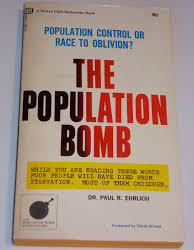
regenerate. Two years later, on the first Earth Day, I began my activism, rounding up the neighborhood kids and staging a clean up of the polluted stream behind our apartment that ran into the Hudson River.

A year later my Beatle idol George Harrison held a "Concert for Bangladesh" to raise awareness of the suffering there. Like many kids worried about the "starving kids in Bangladesh" I asked in school why things were getting so bad. Like most school children around the world, we were told how the population bomb supposedly worked, how it ticked. The idea went back to the Reverend Thomas Malthus who argued in 1798 that "population increases geometrically, while food supplies increase only

arithmetically". This has been the prevailing wisdom for over 2 centuries and is often illustrated by the following graph:http://www.biology.iupui.edu/biocourses/N100/images/ageomgrowth.gif
http://occ.crescentschool.org/geography/human/unitvagricultural/malthusgr aph.jpg
Looks neat, right -- so mathematically precise and inevitable. The problem is that it is wrong. I felt it as a kid. It bothered me throughout middle school and high school and on in to college. The reverend's now famous "Malthusian" predictions of doom and gloom came from a man who never studied biology... we now realize that he was a religious zealot and bigot who made up theories to try and stoke anti- immigration fever, arguing that undesirable poor people were basically breeding like rats. The problem in his logic is easy to spot when you use Nexus thinking: FOOD IS A POPULATION. Food comes from living creatures who have populations. They expand GEOMETRICALLY. If you let them. If you encourage them. It doesn't matter if we are talking about Brewer's yeast or earthworms or oak trees or apple trees or chickens or ears of corn or cattle or cocoa covered ants... whatever you eat comes from living organisms that are programmed to reproduce as fast as they can... that WANT to reproduce... geometrically. Just like us. So... population increases geometrically, whether it is us or our food. Starving kids in Bangladesh or Ethiopia simply shouldn't happen, and, I will insist to you, WOULDN'T, if we allowed the organism we eat to do their thing.
The key to keeping food production in line with food consumption, I have been arguing, is to use the "food-waste-to-fuel-and-fertilizer-and-food" or FW2F3 formula wherein every molecule of nitrogen, phosphorous, pottasium and carbon and micronutrients found in our wastes in our burgeoning cities is transformed immediately, in situ, back into food through the magical transduction of anaerobic and aerobic biodigestion and urban vertical farming and micro-livestock.

Using these simple techologies to close the loops in the food/energy/water nexus, the curves on those graphs should continue to go up in lock step, until we reach the limits set by sunlight. And then we will have to figure out safe, harmless ways to grow not just ourselves and our "economy" but our ecology, and eventually help grow new planets. But even that... the promise of space stations and terraforming planets, isn't out of the question. After all, the one thing that doesn't seem to ever be in any danger of NOT expanding... is the universe."
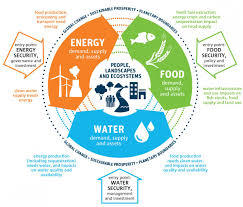
Today’s lecture is about “Progress in food production: a new wave of ancient practices and post-modern technologies that use less water and less energy, produce less waste and can even produce more energy.”
And I believe, to paraphrase Deuteronomy 12:3, we have to start by “tearing down the altars and smashing the sacred pillars” that were erected by wrong headed Malthusians who used a gross misunderstanding of biology and a total lack of nexus and systems thinking to scare us into what I call “induced paralysis for profit”. The idea comes from what is called in economics classes “The Scarcity Model: the fundamental economic assumption of having seemingly unlimited human needs and wants in a world of limited resources, which states that society has insufficient productive resources to fulfill all human wants and needs”.
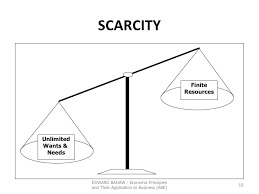
When the scarcity model is used to create fear, to create an atmosphere of doom and gloom, to predict the inevitable arrival of the four horsemen of the apocalypse (Conquest, War, Famine, and Death), political economists and political ecologists suggest that it is much easier for elite groups to manipulate the masses. They control the machinery of conquest and war, and they use the specter of famine to gain their power.
Food production sits at the heart of the nexus – every animal on this planet (and doubtless the vast majority of beings in our universe) finds food to be the fundamental. It is priority number one, for unless you are a being of pure light you need the food that grows with light to survive. And if you spread misinformation that famine is imminent, that starvation is just around the corner, you can mobilize armies.
However, looked at from a FEW Nexus perspective, this fear of famine we
have been living with since Biblical times (the four horsemen are part of the Book of Revelation of Jesus Christ to John of Patmos, at 6:1-8 in the New Testament written during the Roman occupation of Palestine) is a peculiar Middle Eastern and North European phenomenon it turns out, coming from civilizations in regions of the world where water stresses constrained food production. People in well-watered tropical regions rarely felt threatened by food scarcity and in fact were described by anthropologist Marshall Sahlins as living in a state of perpetual abundance. He postulated that hunter- gatherers were, in fact “the original affluent society” at a symposium entitled "Man the Hunter" in 1966 and this idea has been tested and found true for most peoples around the world where water was not a limiting factor. It explains why hunting and gathering and subsistence farming persist to this day, and why so many people resisted being brought into modern civilization or adopting modern agriculture methods. In fact the work of historian Anthropologist Eric Wolf, such as “Peasant Wars of the Twentieth Century” and Yale professor James Scott in books such as “Seeing Like a State: How Certain Schemes to Improve the Human Condition Have Failed” teach us that there have been enough failures due to the form of agriculture that emerged from the conquering civilizations that the conquered were willing to sacrifice their lives to revolt against them. Somehow, it seems, those certain schemes to improve yields were social and ecological disasters that should have been rejected by civilizations but instead were used to confirm the Reverend Malthus’ scientifically unfounded hypothesis – a classic but often neglected example of what is known as confirmation bias – which wiki defines as “the tendency to search for, interpret, favor, and recall information in a way that confirms one's preexisting beliefs or hypotheses, while giving disproportionately less consideration to alternative
possibilities”. When it comes to food production, the alternative possibility, which is persuasively argued in Richard Manning’s book “Against the Grain: How Agriculture Has Hijacked Civilization” is that monocropping annual vegetation and basing civilization on grain agriculture, on the use of plants in the family Poaceae/Graminae, that is the grasses – wheat, rice, corn, barely, oats and sugar – yes, sugar is a grass – is, to caricature the 45th president of the world’s most powerful agriculture and military empire, “ a disaster”.
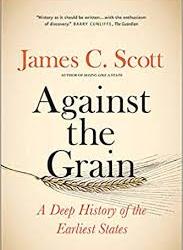

History records that agriculture and famine are the Jekyll and Hyde of the long and often militarized march of civilization. The one came because of the other, says Manning. Most of us were taught the opposite weren’t we? Taught that human life, as the 17th century imperial philosopher Thomas Hobbes decried in his book Leviathan, was “nasty, brutish and short” We were told that humans lived in a state of semi-starvation UNTIL they discovered agriculture. We were told that agriculture saved our species from hunger and misery, gave us the surpluses that enabled our climb to civilization. Sounds good, turns out not to be true.
Even Harvard’s Spencer Wells, a friend of mine who is the geneticist who leads the National Geographic Genographic project writes in his book “Pandora's Seed: The Unforeseen Cost of Civilization” that when humans shifted from hunting and gathering in that original affluent society to grain agriculture the average height of men dropped from about 5 foot 7 to 5 foot 2 and women’s pelvic girdles narrowed to the point where death in childbirth increased in frequency.
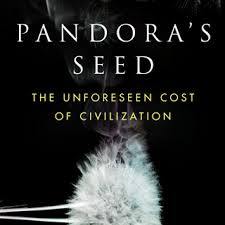
These were clear signs of malnutrition recorded in the fossils. Agriculture was to blame... floodplain agriculture dependent on disturbance species that grow like weeds after a disaster because they are weeds. And they end up causing disasters thereafter because they evolved to live in disaster environments, places where floods and fires ravage the countryside on a regular basis. In effect they DEPEND on disasters for their own reproductive survival. It is as though once we hitched our caboose to the weeds and became weed eaters, we started living for them and not the other way around.
Michael Pollan talks about this in his wonderful book that reframes our relationship to addictive plants called “The Botany of Desire”.
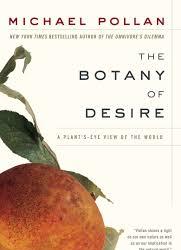
He points out that you could look at us as the slaves of addictive plants that evolved to control us through their effect on our brains so that we would help them reproduce. This idea, which British Scientist Richard Dawkin’s calls “The Extended Phenotype” in the battle of Selfish Genes, isn’t really new.
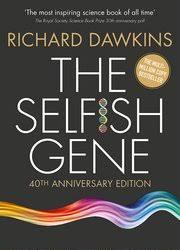
In 1872, when Samuel Butler published his utopian fiction “Erewhon” the major premise of the people who fled Europe to live on the island of Erewhon in the hopes of creating a better civilization was that they would not allow themselves to submit to the control of their addictions or any system that makes us into its own slave. On the island they refuse to use technology like cars and steam engines and typewriters and telegraph or any machines. It isn’t that they don’t know about these things – in fact they have an entire museum where they keep them safely on display in glass cases. They tell visitors, “in your civilization machines don’t serve you, you serve them. You go to work in the morning and waste your days slavishly building more machines and oiling them and fixing them and keeping them running. It is like the bee that is the servant of the flower... flowers can’t move to reproduce themselves, so they addict the bee with beauty and nectar and perfumes and the busy bee spends its whole life toiling just to help make more flowers”. The phenotype of the bee is being controlled by the genes of the flower, not the bee. This is the concept of the extended phenotype, which finds its purest expression in parasitology.

So there are some who believe that the crops we turned to in our modern agricultural systems are acting more like Parasites that food stuffs, and that when we think we are serving food in the “restaurant service” sense , we literally are serving food – i.e. we now serve THEM, as servants.
This makes sense from the perspectives of evolutionary psychology and behavioral ecology.
Whether it was drought in arid desert regions or winter freezing water into ice, the limits to plant growth and reproduction, and hence to animal fecundity were set by the availability of water. In the Middle East, certainly, it was not energy that was missing from the Nexus. Sunshine has always been abundant in those latitudes to provide energy for food production.
In the European countries the harsh winters did indeed constrain plant productivity and famines could result in winter if care wasn’t taken to take the enormous fecundity of the spring, summer and fall and store the harvest surplus for the fallow period. But Hunter Gatherers North and South, in the cold regions or the hot ones, originally depended on agroforestry, on tree crops, on perennials, not annuals. And they depended on the animals that depended on forests – on forest boars and jungle fowl and woodland ungulates – all the ancestors of our modern pigs and chicken and cows. In the north the forest leaf fall in the fall built up incredible rich soils during the winter ready for an explosion of food in the spring and summer which created enough surplus for the mammals we ate to survive the winter. In the south the forests retained the water that fell sporadically and created their own microclimates through transpiration. They forests created environments so rich in the cornucopia of foodstuffs that our mythology now recalls as “The Garden of Eden”.
And if you want some mythological proof of the disaster or agriculture, just look at the curse we were to endure after eating the tree of knowledge and getting kicked out of the garden, “To Adam he said, "Because you listened to your wife and ate fruit from the tree about which I commanded you, 'You must not eat from it,' "Cursed is the ground because of you; through painful toil you will eat food from it all the days of your life. Both thorns and thistles it shall grow for you; And you will eat the plants of the field; 19By the sweat of your face You will eat bread, Till you return to the ground”. So eating bread isn’t salvation, eating bread is the CURSE. No wonder so many hunters and gatherers said, “shoot, I’m going back into the forest, no way I’m doing hard time through painful toil to eat when I can pick fruits and vegetables and trap
animals.” And the fossil evidence of malnutrition affecting the pelvic bones of women, noted by Spencer Wells in Pandora’s Seed, is corroborated in the curse in Genesis when God says, “To the woman he said, "I will make your pains in childbearing very severe; with painful labor you will give birth to children. Your desire will be for your husband, and he will rule over you."
We can even comment on what this reveals about the emergence of patriarchal rule due to the shift to grain agriculture. My experience with hunter-gatherer populations is that the women are usually the ones who
understood the sheer abundance of biodiversity that nature offered to put into the cooking pot. I experienced it when I was living with Melayu and Dyak tribes in the rainforests of Borneo and was taken into the forest by the medicine woman who was cooking our meal and her grandson who climbed the trees to get the foods. She was called the “witch doctor” and as she laid out the huge variety of foods we collected to put in the cooking pot I had images of the witches’ cauldron with its “eyes of newt, frogs legs, bats wings” – all things that would have provided great inexpensive abundant protein but which today are shamefully associated with evil and
witchcraft. After all, women were BURNED at the stake for understanding and promoting biodiversity in diet by the European patriarchy, and children punished or mocked for thinking they could go into the forest as kids do and come back munching on lizards and grubs. Agriculture can be blamed not only for this tremendous patriarchal violence and loss of biodiversity as we simplified the landscape to a handful of weedy grasses, but for what James Scott calls the “dummification” of humanity. At one time, as I experienced among the hunters and gatherers of Borneo, harvesting food was an educational adventure that made women and children experts who rivaled the best Ph.D. botanists and naturalists who Harvard sent out. With agriculture we turned brilliant self-sufficient peasants into outdoor factory workers and, of course, quite literally when you are talking about the first 400 years of agriculture in the European colonized Americas, slaves. The violence inherent in agriculture rears its ugly head everywhere.
And it could be said that Genesis itself records the clearest indication that grain agriculture is the scourge of mankind, the source of its original sin of violence in The story of Cain and Abel. This chapter of the Bible is the clearest indictment of wheat agriculture one could imagine, and nobody seems to comment on it. Abel is a pastoralist who tends a flock of animals who wander about like ungulate hunter gatherers, eating what God has given them. His brother Cain is... a wheat farmer, somehow stupidly living out God’s curse to scratch a living in the hot sun through toil amidst the thistles and thorns that always accompany weed agriculture. Abel brings a lamb meat sacrifice to the altar of God, along with diverse fruits and vegetables he has gathered, and God is pleased.
Cain then comes with a bunch of wheat and the Bible says, “but for Cain and for his offering He had no regard. So Cain became very angry and his countenance fell. Then the LORD said to Cain, "Why are you angry? And why has your countenance fallen?7"If you do well, will not your countenance be lifted up? And if you do not do well, sin is crouching at the door; and its desire is for you, but you must master it."...
To me this is a clear indication that the ancients saw wheat offerings as a kind of sin, the sin of an addiction, an addiction which Cain could not
master. In his anger he turns around and kills his gentle carnivorous animal slaughtering brother.
Think about it for a moment... it is enough to make Vegans go mad: The vegetarian is the killer, the slaughterer of baby goats is the gentle one.
Could it be that this ancient myths were there to warn us that wheat is a weed, that grains are drugs, that we haven’t been growing food all along, but addictive substances that will end up mastering us through the Botany of Desire?
So, to get back to Reverend Malthus, who in my opinion must not have spent an awful lot of time delving into the hermeneutic interpretation of the books he preached in his fiery diatribes against the poor and the immigrants, it is clear to me that the entire Matlhusian premise is based on a fabrication of the weed eaters, who most likely did observe that if they kept planting grains and consuming starches and sugars their own sickly but ever increasing population would outstrip the fecundity of the land and so human populations would increase geometrically while their drug-food agriculture would only increase arithmetically if at all.
But if Abel had been Abel, we might have returned to the garden a long long time ago, where food is a self-increasing population grown in permacultural symbiosis into perpetuity. The good news is, that the world as we know it IS coming to an end. And what is ending isn’t the good life, but the bad life we inherited from our dummified forebears. We can begin again. Permacultural Food Production shows us how.

1 note
·
View note
Text
Star Trek: TOS - title references
A list of all references (I think, I might have missed some) in the episode titles of Star Trek: The Original Series. In addition to the references to various literary works, I’ve also included the titles with references to proverbs or obscure words that non-native English speakers or even some English speakers might not catch. So, basically, a bunch of useless trivia for nerds like me.
(I’m using the chronological order for the episodes. Also, I’m not putting links on the sources because Tumblr is a b*tch)
S1EP1 Where No Man Has Gone Before - the title is obviously a reference to the final line in the series-opening poem "To boldly go where no man has gone before". Appropriate for the pilot episode
S1EP4 The Enemy Within - the origin of this phrase is unknown, it has been used for a long time in various contexts like within religion and military. Example from A Course of Family Prayer by Augustus Montague Toplady (1794) "Lord thou knowest our weaknesses... our danger from the enemy of souls... and above all, from the enemy within, our vile flesh and deceitful hearts, so apt to betray us into sin." (source: wordhistories.net)
S1EP5 The Man Trap - a slang word for a woman who is purported to be dangerously seductive or who schemes in her amours; a femme fatale. An obvious reference to how the creature lures its victims in by changing its appearance according to the victim’s preferences. (source: Dictionary.com)
S1EP6 The Naked Time - Nakedness can refer to literal physical nakedness or a figurative baring of the soul which we saw happen to the crewmembers, but especially to Kirk and Spock.
S1EP7 Charlie X - X is often used to represent the name of a person or thing that is not known or stated, can also be used to indicate a mistake or to remove something from lists (source: Cambridge English Dictionary)
S1EP8 Balance of Terror - the distribution of nuclear arms among nations such that no nation will initiate an attack for fear of retaliation (source: Dictionary.com)
S1EP9 What Are Little Girls Made Of? - "What are little girls made of? Sugar and spice and all things nice, that's what little girls are made of." Old nursery rhyme from the early 19th century.
S1EP10 Dagger of the Mind - Machbet, Act 2, Scene 1, Line 38, "Or art thou but a dagger of the mind, a false creation, proceeding from the heat-oppressèd brain?" (37-39) Machbet is experiencing a moral crisis about killing Duncan and is imagining the act he is about to commit. This manifest itself as a hallucination; “a dagger of the mind”. “ "Dagger of the mind" can read in two ways. First, there's the literal contrast of tangible reality and Macbeth's imagination. Second, you have the metaphor of Macbeth's guilt—and doubt—manifesting itself as a vision as he waits upon the signal from his wife. False in this context plays upon a number of meanings. While the primary reading is "unreal," shades of "deceitful, inconstant; not to be trusted" are equally applicable.” What Machbet is seeing is not reality, just like the feelings the neural neutraliser causes in Kirk. (source: Bardweb > SRC Features > Speech Analysis > Machbet > Go to line analysis)
S1EP11 Miri - Name with a Hebrew origin that’s most common meaning seems to be “bitter”. Other possible meanings are “sea of sorrow, beloved, wished for child”. (source: various baby name sites, lol)
S1EP12 The Conscience of the King - Hamlet, Act 2, Scene 2, Line 565 "the play's the thing wherein I'll catch the conscience of the king" (564-65) Hamlet stages a play of his father's murder to get Claudius to confess his involvement. This is also the play that the Karidians perform on the Enterprise. Since this episode is also about catching a murderer the title choice should be obvious.
S1EP15&16 The Menagerie - menagerie: a collection of wild animals kept in captivity for exhibition; A strange or diverse collection of people or things (source: Oxford Eglish Dictionary)
S1EP22 The Return of the Archons - from the Greek word archon: ruler, to rule
S1EP25 This Side of Paradise - possibly taking its name from F. Scott Fitzgerald's book This Side of Paradise or the poem that gave its name to the book Tiare Tahiti by Rubert Brooke. The book explores love warped by greed and status-seeking. The poem explores afterlife and how it might not be all that it's made out to be, hence the phrase "this (worse) side of paradise", possibly alluding to how Spock and the other crew members have to give up their personalities and real feelings to reach euphoria. In short, paradise is a lie they have to wake up from.
S1EP27 Errand of Mercy - The title comes from The Life and Adventures of Nicholas Nickleby by Charles Dickens "It is an errand of mercy which brings me here. Pray, let me discharge it". Errand of mercy is “a trip undertaken to help someone who is in trouble” (sources: Memory Alpha - Errand of Mercy: Story and script, Collins English Dictionary)
S1EP29 The City on the Edge of Forever - “The title is a reference to both the dead city on the planet and New York, in the original script when Kirk first sees the city sparkling on a hilltop like a jewel he says it looks like "a city on the edge of forever"“ (whatever that means) (btw the original script was so bad guys, like so bad (Kirk orders his crew to execute a guy for murder, like wtf) (source: Memory Alpha - The City on the Edge of Forever: Story)
S2EP1 Catspaw - “The title of this episode, "Catspaw", is a term that describes a person used by another as a dupe; as McCoy points out, Scott and Sulu are used as catspaws to lure more crewmen down” (source: Memory Alpha - Catspaw: Story and production)
S2EP2 Metamorphosis - Definition of Metamorphosis 1a: change of physical form, structure, or substance especially by supernatural means, b: a striking alteration in appearance, character, or circumstances 2: a typically marked and more or less abrupt developmental change in the form or structure of an animal (such as a butterfly or a frog) occurring subsequent to birth or hatching (source: Merriam Webster)
S2EP3 Friday's Child - The episode's title is derived from a traditional English poem, known as "Monday's Child". The reference is to a line in the poem: "Friday's child is full of woe" or alternatively "Friday's child is loving and giving". Given the unfortunate circumstances of the child’s birth, it would seem that the former version of the poem was intended. (source: Memory Alpha - Friday’s Child: Background information)
S2EP4 Who Mourns for Adonais - “The title is taken from Adonais: An Elegy on the Death of John Keats by Percy Bysshe Shelley. Line 415 reads "Who mourns for Adonais?". Shelley's Adonais is derived from Adonis, a male figure of Greek mythology associated with fertility. Also, "Adonais" would be the English plural of the Hebrew spoken name of God, so it would mean "Who Mourns for Gods?"” (source: Memory Alpha - Who Mourns for Adonais: Story and production)
S2EP5 Amok Time - Definition of Amok: an episode of sudden mass assault against people or objects usually by a single individual following a period of brooding that has traditionally been regarded as occurring especially in Malaysian culture but is now increasingly viewed as psychopathological behaviour occurring worldwide in numerous countries and cultures, 1: in a violently raging, wild, or uncontrolled manner, 2: in a murderously frenzied state (source: Merriam-Webster)
S2EP7 Wolf in the Fold - An ancient expression that means that there is someone in a group who presents a danger to the rest of the people in it. The first known usage in written form is from Virgil's Eclogues:
“The wolf is fatal in the fold, and so Are hailstones to ripe corn, wind blasts to trees— Or — Amaryllis' anger to us all."
S2EP8 The Changeling - Definition of Changeling: 1) archaic: turncoat, 2) a child secretly exchanged for another in infancy, 3) archaic: imbecile (source: Merriam-Webster)
S2EP9 The Apple - The title is most likely a reference to the Apple in the creation story. The citizens of the planet Gamma Trinaguli VI (which was referred to as the Garden of Eden) were being controlled by a computer called Vaal. When Vaal was destroyed, they bit the metaphorical Apple from the Tree of Knowledge and were banished from the Garden.
S2EP12 I, Mudd - “Possible inspirations for the title include: I, Robot, Isaac Asimov's 1950 android-themed short story collection, the title of which was itself inspired by "I, Robot", Eando Binder's 1939 short story with an android hero, which had been adapted for TV in 1964 with Leonard Nimoy in a supporting role; I, Claudius, a 1934 novel by Robert Graves about the life of the Roman Emperor Claudius (the 1976 BBC production of which featured Patrick Stewart). Like Mudd "The First" in this episode, the subject of I, Claudius is also a despotic ruler who views himself in a more flattering light; Lines from Kurt Vonnegut's 1963 novel Cat's Cradle, which detail the creation myth of Bokononism: "I, mud, sat up and saw what a nice job God had done."” (source: Memory Alpha - I, Mudd: Story and Production)
S2EP14 Bread and Circuses - The title, "Bread and Circuses", comes from a line in the Satire X by the Roman satirist Juvenal, and refers to the practice in ancient Rome of providing a regular free bread (or grain) dole to the lower classes and free entertainment in the city's arenas and circuses, both of which had the effect of preventing civil unrest in the populace. (source: Memory Alpha -Bread and Circuses: Story and script). In a political context, the phrase means to generate public approval, not by excellence in public service or public policy, but by diversion, distraction or by satisfying the most immediate or base requirements of a populace by offering a palliative: for example food (bread) or entertainment (circuses). Juvenal used it to decry the selfishness of common people and their neglect of wider concerns. The phrase implies a population's erosion or ignorance of civic duty as a priority. (Source: Wikipedia - Bread and circuses)
S2Ep20 A Piece of the Action - If someone wants to have a piece of the action or a slice of the action, they want to take part in an exciting activity or situation, usually in order to make money or become more important. (source: Collins English Dictionary)
S2Ep21 By Any Other Name - “The title is part of a quotation from Romeo and Juliet, Act II, Scene 2. "What's in a name? That which we call a rose by any other name would smell as sweet." Kirk recites it to Kelinda. It is often used to convey the idea that although you can change the name of something, its nature will remain the same. In this case, the Kelvans become Human. In doing so, they start behaving as Humans do.” (source: Memory Alpha - By Any Other Name: Story and production)
S2Ep07 Is There in Truth No Beauty? - The episode title is from a poem by the 17th century English poet and clergyman George Herbert, from his poem "Jordan (I)", line 2: "Who says that fictions only and false hair/ Become a verse? Is there in truth no beauty?" (source: Memory Alpha - Is There in Truth No Beauty?: Background information) ‘Jordan (I)’ is a poem about poetry: George Herbert takes as his theme the proper material for poetry, as well as the proper language for poetry. In the first stanza of ‘Jordan (I)’, Herbert asks, why is it that people consider only made-up or fictional stories and situations suitable for poetry? Why aren’t things that are true to life considered beautiful, and therefore fit material for the poet to use as well?... Herbert is questioning why poetry, which is itself a construction, has to express itself by referring to other false constructions, rather than directly depicting life as it is. (source: Interesting Literature - A Short Analysis of George Herbert’s Jordan (I))
S3EP11 Day of the Dove - The word dove in the title is a possible allusion to their status as symbols of peace and love. Appropriate for an episode where the Klingons and the Enterprise crew come together to defeat a common enemy.
S3Ep16 Whom the Gods Destroy - An adaption of an anonymous Greek proverb that is often wrongly attributed to Euripides. An early version of this phrase appears in the play Antigone by Sophocles, "Evil appears as good in the minds of those whom God leads to destruction ". The version in the title is spoken by Prometheus in the poem The Masque of Pandora (1875) by Henry Wadsworth Longfellow "Whom the gods destroy they first make mad” (source: Memory Alpha - Whom Gods Destroy: Story and Script)
S3Ep21 Requiem for Methuselah - “This episode's title is a dual allusion: first to a ritualistic liturgy of Roman Catholicism (and other related religions), the "Requiem" being a Mass for the dead, and second to Methuselah, son of the Biblical prophet Enoch and paternal grandfather to Noah, who was the longest-lived Human being in the Bible (in Genesis 5:21-27) having lived 969 years; existing for nearly a millennium, Methuselah's lifespan has historically become a proverbial reference for longevity.” (source: Memory Alpha - Requiem for Methuselah: Story)
S3Ep23 All Our Yesterdays - Machbet, Act 5, Scene 5, Line 22. A soliloquy after Macbeth's wife dies. "She should have died hereafter; There would have been a time for such a word. — To-morrow, and to-morrow, and to-morrow, Creeps in this petty pace from day to day, To the last syllable of recorded time; And all our yesterdays have lighted fools The way to dusty death. Out, out, brief candle! Life's but a walking shadow, a poor player That struts and frets his hour upon the stage And then is heard no more. It is a tale Told by an idiot, full of sound and fury. Signifying nothing." To paraphrase: people see the future as bright even though eventually everyone will die. Life is a walking shadow that will end in death, not a litten path to a brighter future. In the context of this episode, the title seems to allude to the time travel that takes place. Spock and McCoy are literally trapped in “our yesterday(s)”. Spock’s love interest Zarabeth is also long dead when they return back to the future, so she’s taking on the role of Lady Machbet.
#star trek#tos#spirk#tagging this as spirk so people might actually see it#sorry lol#i put a lot of work in this
14 notes
·
View notes